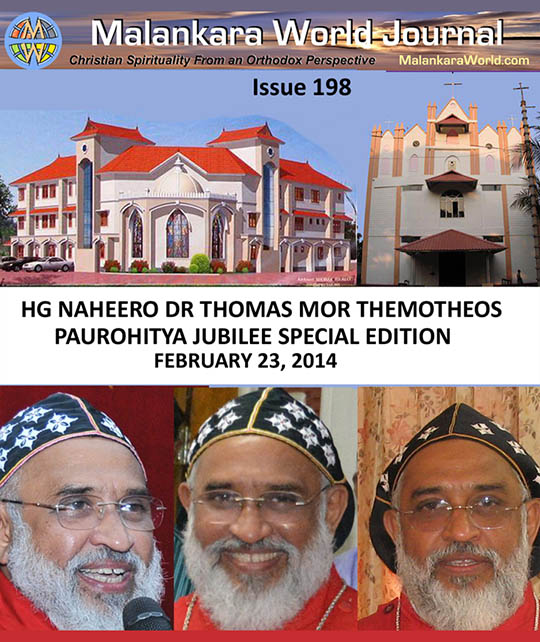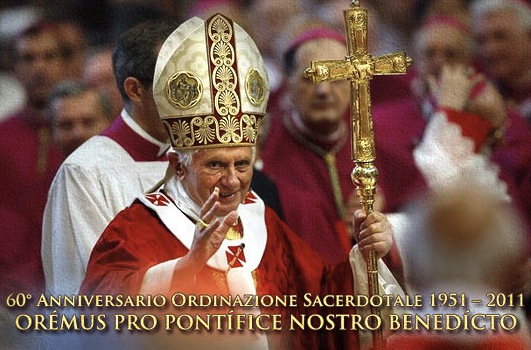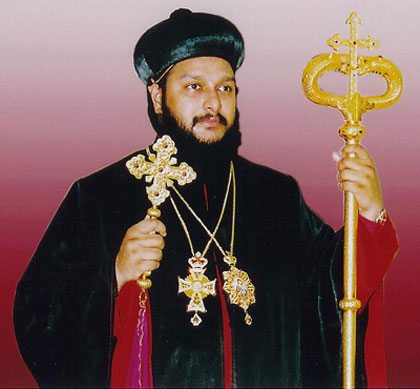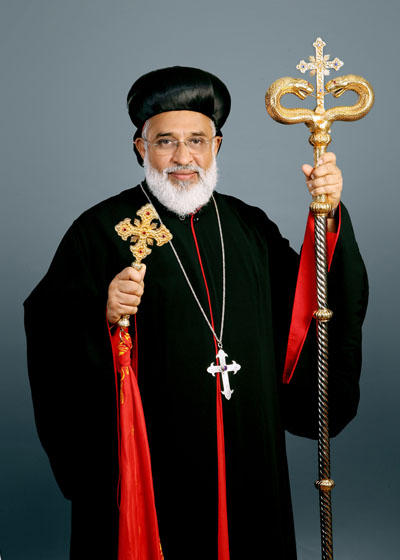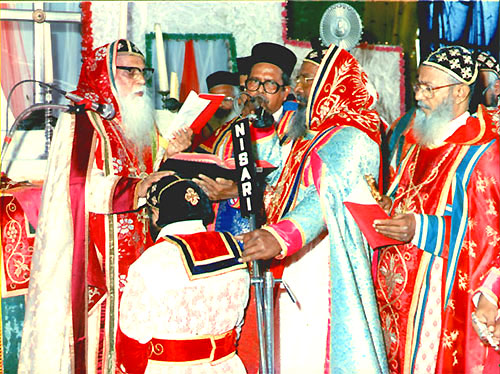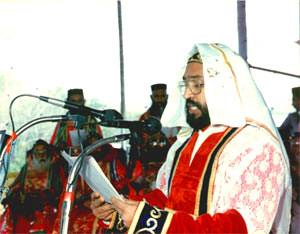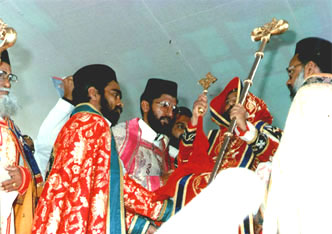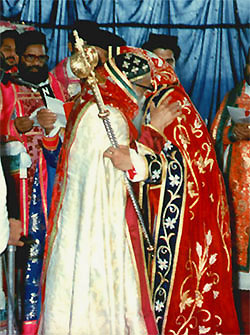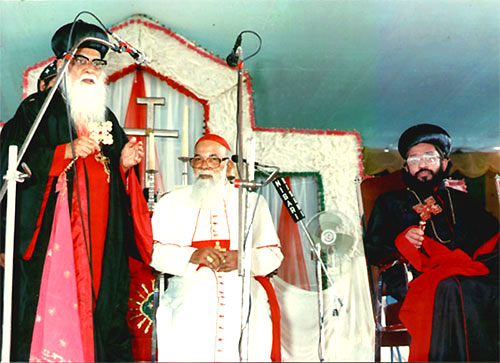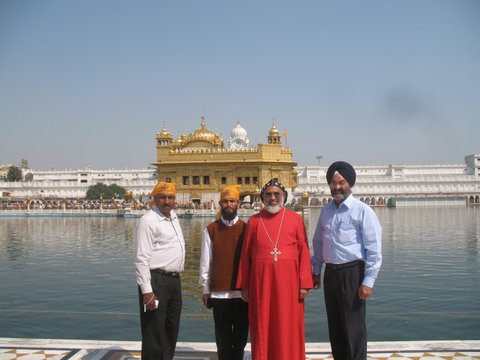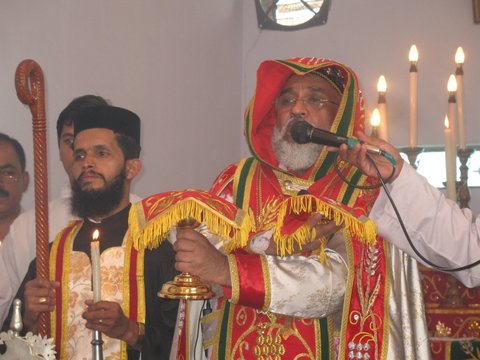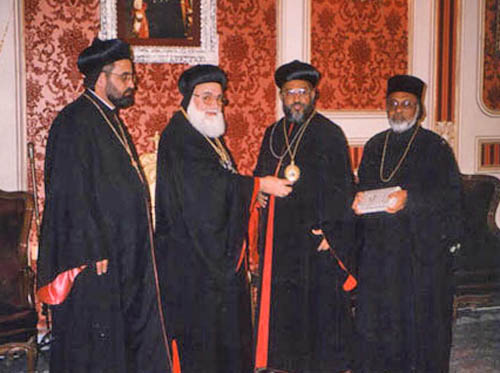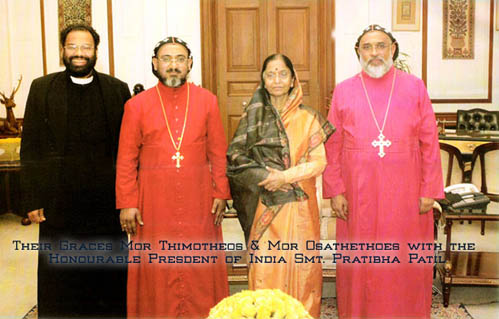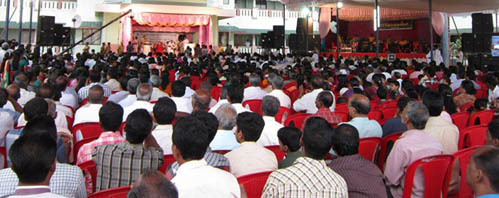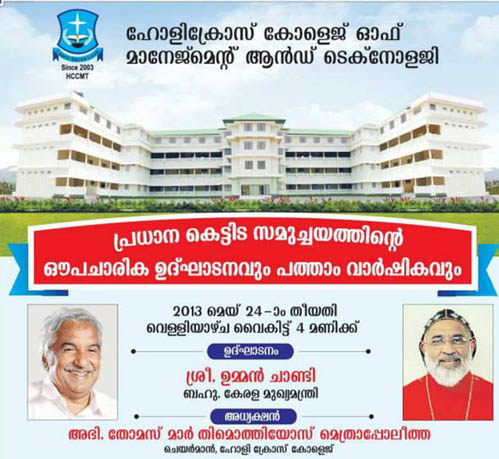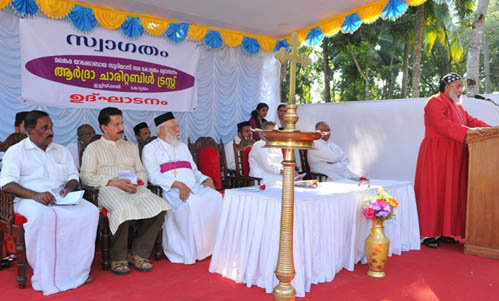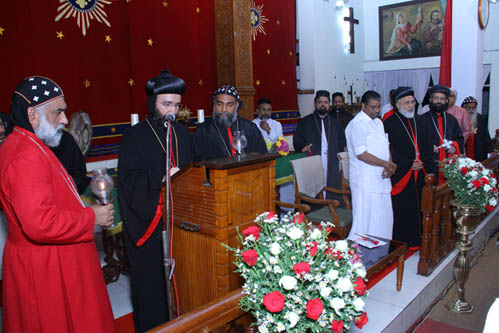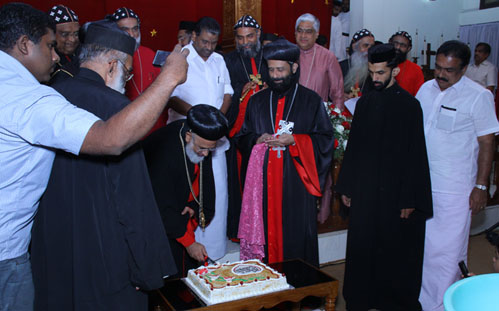
|
|
|
Malankara World Journal
H.G. Naheero Dr. Thomas Mor Themotheos Golden Jubilee Special
Volume 4 No. 198 February 23, 2014
If the Journal is not displayed properly, please click on the link below (or copy and paste) to read from web
http://www.MalankaraWorld.com/Newsletter/MWJ_198.htm Archives: http://www.MalankaraWorld.com/Newsletter/Default.htm |
|
|
|
|
TABLE OF CONTENTS
|
|
|
1. Foreword: Naheero His Grace Dr. Thomas Mor Themotheos Metropolitan
I. THEME: LOVE - LOVE YOUR ENEMIES 2. Loving Your Enemies by Martin Luther King, Jr.
3. The Greatest Virtue is Love: Love of Neighbor
II. THEMOTHEOS THIRUMENI PAUROHITHYA JUBILEE SPECIAL 7. Homily Given at the 60th Anniversary of Priesthood by Pope Benedict XVI
8. Themotheos Thirumeni: A Disciplined Leader by HE Yeldo Mor Theethose
9. H. G. Dr. Thomas Mor Themotheos - Paurohitya Golden Jubilee by Rev. Fr. Jose Daniel Paitel
11. Mangala Pathram by Chev. Shibu Mathew, Pullolickal
13. Prayer for Priests by Fr. Mark
|
|
|
by Dr. Jacob Mathew When I think of Themotheos Thirumeni, the first thing that comes to my mind is "ignorance is bliss." I will explain why shortly. The second fascinating thing about thirumeni is that he takes full advantage of his clocks and watches. In a country, where people routinely comes 3-4 hours late after a scheduled event and where politicians and musicians come late with the belief that it is the way to command respect, Themotheos thirumeni is a stickler for time. If you call thirumeni for a function and state that the program will start at 9:00 AM, thirumeni will be there at 8:57 AM and will be ready to start the program promptly at 9:00 AM, whether others are ready or not. He will leave immediately after the program is over. The third and the most impressive aspect of Themotheos thirumeni is that, where the fighting between the two Christian factions are as common as pedestrians in the street and occasionally spills over into the streets, Themotheos thirumeni will have nothing to do with that. Don't misunderstand. Thirumeni knows exactly where he stands and no one is going to change it, other than perhaps God. But he also realizes that there is nothing to be gained by hurling abuses at each other. He respects everyone irrespective of their religion, caste or national origin or faith. I am not sure whether the many years HG had spent in North India, especially with Sikhs, had anything to do with that. I have a friend, Ratanjit Sondhi, who has dedicated a good chunk of the fortune he amassed in his company to teaching what he calls 'spirituality' and not 'religiosity.' He has written several books and has his own radio program which now goes all over the world through internet. He is a most sought after key note speaker. We had shared podium together in many occasions and have spent lot of time talking with each other on topics of interest. He is a fascinating man. I once asked him how can practice what he preaches when he says that he does not hate or have any ill will towards anyone. (Once a person in the audience asked him, "Can you say that about a person who has raped your sister or wife?") Ratanjit replied, "Jacob, we are all creations of God. As a Christian, you know that you are made in the image of God. We are all children of God. Each one of us has some divinity in us as we are created by God. Even if a person is the most evil person in the world, he/she still has that "divinity' in him/her. (You may have to look hard to find it in some cases!) So, when I see a person, I respect the divinity in that person, not the evil. I respect the divine in him. How can I disrespect a person who has the "divinity" in him? When you look at it this way, we can also see how Blessed Mother Teresa, Mahatma Gandhi, etc. viewed people who disagreed with them. But they all learned this from Jesus Christ who preached in the sermon on the mount as reported in Matthew 5:44 and Luke 6:27,35, to "love your enemies." Jesus gave us the commandment to "love Each Other." It is generally agreed that "Loving your enemies" is one of the hardest commandments Jesus gave. But there is more to this commandment than what it implies literally. I have selected the topic "Love -- Loving your neighbors" as the theme for this special issue of Malankara World Journal because that is something Themotheos Thirumeni practices and is best known for. We have provided a highly selected list of articles that explains what this commandment means. The best article on this, in my opinion (I have read about 35 articles before narrowing them down to 5 in this journal) is the sermon by Rev. Martin Luther King, Jr., entitled 'Loving Your Enemies.' It is a classic. You may have thought that his 'I have a dream' speech is his best. It is the most emotional. His best, in my opinion is 'Loving Your Enemies.' Like Ranjit Sondhe, Rev. King also believes that each person has dual natures, good and evil. Goodness is related to his divinity and the evil, perhaps, is related to Satan. The key is to respect the goodness or divinity. Other articles in this collection discuss topics such as, who is the enemy? Is enemy is always outside? etc. I recommend that you read this collection carefully and meditate on them. May you be inspired to follow Themotheos Thirumeni in learning to "disagree without being disagreeable" and find areas where we can agree on. The third thing most agree about Themotheos Thirumeni is the fact that he is a well-respected scholar. His sermons are packed with wisdom, but to the point. Everyone I talked to told me about how much they respect thirumeni as a scholar in our church. Recognizing the importance of developing our young people into future leaders, Thirumeni has undertaken the task of promoting education, by starting schools and colleges wherever he went. His first school was at Bangalore, which has become a high school now. His latest college is in Puttady, near Kumily - Holly Cross College of Management and Technology. I had the fortune to visit this college two years ago. The first building that welcomes you as you enter the college campus is the guest house. Like at the Bishop's house where everyone who visits will not be sent away without offering coffee and snacks (emulating Jesus who told his disciples to feed the multitude who came to listen him speak), his college also has taken up this hospitality concept very well. The building is very modern. Computers are all over the place. A huge library has books as well as online resources. The back of the college offer a panoramic vista of the High Ranges, reminiscent of what Moses saw when he looked at the 'land of milk and honey' from far away before his death. It is the God's own country at its best, it reminded me of the mist covered peaks in the Smoky Mountains in Tennessee and North Carolinas in United States. I had one of the best fish curries while visiting Thirumeni's college. I wondered where they get such fresh fish way up in the Western Ghats. Thirumeni has some real big goals for his college. Pope Benedict XVI is considered to be one of the foremost scholar in Catholic Church - equivalent to the position Themotheos thirumeni enjoys in our church. Pope Benedict has the knack of explaining complex theological subjects in simple to understand way. On his 60th anniversary of priesthood, Pope Benedict XVI reflected in front of a new class of bishops what priesthood really means - its responsibility as well as power. I have included this homily in this keepsake edition because both laity and clergy can benefit from reading it. After reading it, you will never look at John 15:15 without awe when Christ said, "I no longer call you servants, but friends." The disciples, and later clergy, are in a special, distinguished circle of people who are called "friends of Jesus", the son of God, the second person of trinity. The friends enjoy powers that servants don't have. They are given the power to absolve sins. Only God can forgive sins; that is why Pharisees and scribes got mad at Jesus when he said, "your sins are forgiven." Now, like Jesus, our priests and bishops can absolve sins because Jesus gave them that authority. Think of the awesomeness of this. Read that article with a commentary by Fr. Mark, who further explains the imagery and mystery associated with what we do as Christians. Themotheos thirumeni has a long list of charitable and mission activities all over India. Frankly, I was surprised by all things Thirumeni do. His Grace is also one of the very first to embrace pre-marital counseling in our church. It became a model for other dioceses to follow. The Tuesday retreats at St. Joseph's Cathedral is attended by people near and far. The vanitha samajam people do all kinds of creative ways to help people and are ranked one of the best in our church. The list goes on and on. Our Paitel achen says in the accompanying article that God has appointed "watchmen for Thirumeni's lips and mouth" as we pray in our common prayers. Thirumeni cannot be provoked to say anything bad about anyone. He listens intently though. He is a stern disciplinarian; but that is tempered with mercy. Theethose thirumeni describes the love and respect shown by other bishops in the church towards Themotheos Thirumeni. Our Holy Father has awarded the title "Naheero" in recognition of the many talents of Themotheos Thirumeni. Edathara achen, the diocesan secretary of the American diocese, talks about the leadership skills of Themotheos thirumeni. Hopefully, you will get an idea of the love, respect and affection the people of Malankara Archdiocese of North America has towards Themotheos Thirumeni by reading their reflections. Several other people were also planning to write for this issue, but could not complete them in time due to the extremely short timeframe we had to work on. On a personal note, I have two bishops I call "my first cousin's first cousin; but not a first cousin". One is Rt. Rev. Dr. Geevarghese Mar Theodosius Episcopa, currently diocesan bishop of Marthoma Church in NA. The other is HG Dr. Naheero Thomas Mor Themotheos Metropolitan of Jacobite Church. When you look at these two bishops, you will be impressed that both are respected scholars in their church and well versed with computers too. Is that a coincidence? This has already become too long a foreword; so I will defer talking about "Ignorance is Bliss" for some other occasion. If you are too curious, ask me or ask thirumeni. But after listening to His Grace, you may come to the conclusion that "Ignorance is Bliss." We wish thirumeni all the best as he pass another milestone in his remarkable journey. Barekmore
Dr. Jacob Mathew PS: To learn more about Themotheos Thirumeni, please visit Malankara World's portal for Thirumeni at: http://www.malankaraworld.com/Library/ChurchFathers/MorThomasThemotheos/Default.htm |
|
|
by Martin Luther King, Jr. I want to use as a subject from which to preach this morning a very familiar subject, and it is familiar to you because I have preached from this subject twice before to my knowing in this pulpit. I try to make it a, something of a custom or tradition to preach from this passage of Scripture at least once a year, adding new insights that I develop along the way out of new experiences as I give these messages. Although the basic content is the same, new insights and new experiences naturally make for new illustrations. So I want to turn your attention to this subject: "Loving Your Enemies." It's so basic to me because it is a part of my basic philosophical and theological orientation - the whole idea of love, the whole philosophy of love. In the fifth chapter of the gospel as recorded by Saint Matthew, we read these very arresting words flowing from the lips of our Lord and Master:
Certainly these are great words, words lifted to cosmic proportions. And over the centuries, many persons have argued that this is an extremely difficult command. Many would go so far as to say that it just isn't possible to move out into the actual practice of this glorious command. They would go on to say that this is just additional proof that Jesus was an impractical idealist who never quite came down to earth. So the arguments abound. But far from being an impractical idealist, Jesus has become the practical realist. The words of this text glitter in our eyes with a new urgency. Far from being the pious injunction of a utopian dreamer, this command is an absolute necessity for the survival of our civilization. Yes, it is love that will save our world and our civilization, love even for enemies. Now let me hasten to say that Jesus was very serious when he gave this command; he wasn't playing. He realized that it's hard to love your enemies. He realized that it's difficult to love those persons who seek to defeat you, those persons who say evil things about you. He realized that it was painfully hard, pressingly hard. But he wasn't playing. And we cannot dismiss this passage as just another example of Oriental hyperbole, just a sort of exaggeration to get over the point. This is a basic philosophy of all that we hear coming from the lips of our Master. Because Jesus wasn't playing; because he was serious. We have the Christian and moral responsibility to seek to discover the meaning of these words, and to discover how we can live out this command, and why we should live by this command. Now first let us deal with this question, which is the practical question: How do you go about loving your enemies? I think the first thing is this: In order to love your enemies, you must begin by analyzing self. And I'm sure that seems strange to you, that I start out telling you this morning that you love your enemies by beginning with a look at self. It seems to me that that is the first and foremost way to come to an adequate discovery to the how of this situation. Now, I'm aware of the fact that some people will not like you, not because of something you have done to them, but they just won't like you. I'm quite aware of that. Some people aren't going to like the way you walk; some people aren't going to like the way you talk. Some people aren't going to like you because you can do your job better than they can do theirs. Some people aren't going to like you because other people like you, and because you're popular, and because you're well-liked, they aren't going to like you. Some people aren't going to like you because your hair is a little shorter than theirs or your hair is a little longer than theirs. Some people aren't going to like you because your skin is a little brighter than theirs; and others aren't going to like you because your skin is a little darker than theirs. So that some people aren't going to like you. They're going to dislike you, not because of something that you've done to them, but because of various jealous reactions and other reactions that are so prevalent in human nature. But after looking at these things and admitting these things, we must face the fact that an individual might dislike us because of something that we've done deep down in the past, some personality attribute that we possess, something that we've done deep down in the past and we've forgotten about it; but it was that something that aroused the hate response within the individual. That is why I say, begin with yourself. There might be something within you that arouses the tragic hate response in the other individual. This is true in our international struggle. We look at the struggle, the ideological struggle between communism on the one hand and democracy on the other, and we see the struggle between America and Russia. Now certainly, we can never give our allegiance to the Russian way of life, to the communistic way of life, because communism is based on an ethical relativism and a metaphysical materialism that no Christian can accept. When we look at the methods of communism, a philosophy where somehow the end justifies the means, we cannot accept that because we believe as Christians that the end is pre-existent in the means. But in spite of all of the weaknesses and evils inherent in communism, we must at the same time see the weaknesses and evils within democracy. Democracy is the greatest form of government to my mind that man has ever conceived, but the weakness is that we have never touched it. Isn't it true that we have often taken necessities from the masses to give luxuries to the classes? Isn't it true that we have often in our democracy trampled over individuals and races with the iron feet of oppression? Isn't it true that through our Western powers we have perpetuated colonialism and imperialism? And all of these things must be taken under consideration as we look at Russia. We must face the fact that the rhythmic beat of the deep rumblings of discontent from Asia and Africa is at bottom a revolt against the imperialism and colonialism perpetuated by Western civilization all these many years. The success of communism in the world today is due to the failure of democracy to live up to the noble ideals and principles inherent in its system. And this is what Jesus means when he said: "How is it that you can see the mote in your brother's eye and not see the beam in your own eye?" Or to put it in Moffatt's translation: "How is it that you see the splinter in your brother's eye and fail to see the plank in your own eye?" And this is one of the tragedies of human nature. So we begin to love our enemies and love those persons that hate us whether in collective life or individual life by looking at ourselves. A second thing that an individual must do in seeking to love his enemy is to discover the element of good in his enemy, and every time you begin to hate that person and think of hating that person, realize that there is some good there and look at those good points which will over-balance the bad points. I've said to you on many occasions that each of us is something of a schizophrenic personality. We're split up and divided against ourselves. And there is something of a civil war going on within all of our lives. There is a recalcitrant South of our soul revolting against the North of our soul. And there is this continual struggle within the very structure of every individual life. There is something within all of us that causes us to cry out with Ovid, the Latin poet, "I see and approve the better things of life, but the evil things I do." There is something within all of us that causes us to cry out with Plato that the human personality is like a charioteer with two headstrong horses, each wanting to go in different directions. There is something within each of us that causes us to cry out with Goethe, "There is enough stuff in me to make both a gentleman and a rogue." There is something within each of us that causes us to cry out with Apostle Paul, "I see and approve the better things of life, but the evil things I do." So somehow the "isness" of our present nature is out of harmony with the eternal "oughtness" that forever confronts us. And this simply means this: That within the best of us, there is some evil, and within the worst of us, there is some good. When we come to see this, we take a different attitude toward individuals. The person who hates you most has some good in him; even the nation that hates you most has some good in it; even the race that hates you most has some good in it. And when you come to the point that you look in the face of every man and see deep down within him what religion calls "the image of God," you begin to love him in spite of. No matter what he does, you see God's image there. There is an element of goodness that he can never sluff off (get rid of). Discover the element of good in your enemy. And as you seek to hate him, find the center of goodness and place your attention there and you will take a new attitude. Another way that you love your enemy is this: When the opportunity presents itself for you to defeat your enemy, that is the time which you must not do it. There will come a time, in many instances, when the person who hates you most, the person who has misused you most, the person who has gossiped about you most, the person who has spread false rumors about you most, there will come a time when you will have an opportunity to defeat that person. It might be in terms of a recommendation for a job; it might be in terms of helping that person to make some move in life. That's the time you must do it. That is the meaning of love. In the final analysis, love is not this sentimental something that we talk about. It's not merely an emotional something. Love is creative, understanding goodwill for all men. It is the refusal to defeat any individual. When you rise to the level of love, of its great beauty and power, you seek only to defeat evil systems. Individuals who happen to be caught up in that system, you love, but you seek to defeat the system. The Greek language, as I've said so often before, is very powerful at this point. It comes to our aid beautifully in giving us the real meaning and depth of the whole philosophy of love. And I think it is quite apropos at this point, for you see the Greek language has three words for love, interestingly enough. It talks about love as eros. That's one word for love. Eros is a sort of, aesthetic love. Plato talks about it a great deal in his dialogues, a sort of yearning of the soul for the realm of the gods. And it's come to us to be a sort of romantic love, though it's a beautiful love. Everybody has experienced eros in all of its beauty when you find some individual that is attractive to you and that you pour out all of your like and your love on that individual. That is eros, you see, and it's a powerful, beautiful love that is given to us through all of the beauty of literature; we read about it. Then the Greek language talks about philia, and that's another type of love that's also beautiful. It is a sort of intimate affection between personal friends. And this is the type of love that you have for those persons that you're friendly with, your intimate friends, or people that you call on the telephone and you go by to have dinner with, and your roommate in college and that type of thing. It's a sort of reciprocal love. On this level, you like a person because that person likes you. You love on this level, because you are loved. You love on this level, because there's something about the person you love that is likeable to you. This too is a beautiful love. You can communicate with a person; you have certain things in common; you like to do things together. This is philia. The Greek language comes out with another word for love. It is the word agape. And agape is more than eros; agape is more than philia; agape is something of the understanding, creative, redemptive goodwill for all men. It is a love that seeks nothing in return. It is an overflowing love; it's what theologians would call the love of God working in the lives of men. And when you rise to love on this level, you begin to love men, not because they are likeable, but because God loves them. You look at every man, and you love him because you know God loves him. And he might be the worst person you've ever seen. And this is what Jesus means, I think, in this very passage when he says, "Love your enemy." And it's significant that he does not say, "Like your enemy." Like is a sentimental something, an affectionate something. There are a lot of people that I find it difficult to like. I don't like what they do to me. I don't like what they say about me and other people. I don't like their attitudes. I don't like some of the things they're doing. I don't like them. But Jesus says love them. And love is greater than like. Love is understanding, redemptive goodwill for all men, so that you love everybody, because God loves them. You refuse to do anything that will defeat an individual, because you have agape in your soul. And here you come to the point that you love the individual who does the evil deed, while hating the deed that the person does. This is what Jesus means when he says, "Love your enemy." This is the way to do it. When the opportunity presents itself when you can defeat your enemy, you must not do it. Now for the few moments left, let us move from the practical how to the theoretical why. It's not only necessary to know how to go about loving your enemies, but also to go down into the question of why we should love our enemies. I think the first reason that we should love our enemies, and I think this was at the very center of Jesus' thinking, is this: that hate for hate only intensifies the existence of hate and evil in the universe. If I hit you and you hit me and I hit you back and you hit me back and go on, you see, that goes on ad infinitum. [tapping on pulpit] It just never ends. Somewhere somebody must have a little sense, and that's the strong person. The strong person is the person who can cut off the chain of hate, the chain of evil. And that is the tragedy of hate, that it doesn't cut it off. It only intensifies the existence of hate and evil in the universe. Somebody must have religion enough and morality enough to cut it off and inject within the very structure of the universe that strong and powerful element of love. I think I mentioned before that sometime ago my brother and I were driving one evening to Chattanooga, Tennessee, from Atlanta. He was driving the car. And for some reason the drivers were very discourteous that night. They didn't dim their lights; hardly any driver that passed by dimmed his lights. And I remember very vividly, my brother A. D. looked over and in a tone of anger said: "I know what I'm going to do. The next car that comes along here and refuses to dim the lights, I'm going to fail to dim mine and pour them on in all of their power." And I looked at him right quick and said: "Oh no, don't do that. There'd be too much light on this highway, and it will end up in mutual destruction for all. Somebody got to have some sense on this highway." Somebody must have sense enough to dim the lights, and that is the trouble, isn't it? That as all of the civilizations of the world move up the highway of history, so many civilizations, having looked at other civilizations that refused to dim the lights, and they decided to refuse to dim theirs. And Toynbee tells that out of the twenty-two civilizations that have risen up, all but about seven have found themselves in the junkheap of destruction. It is because civilizations fail to have sense enough to dim the lights. And if somebody doesn't have sense enough to turn on the dim and beautiful and powerful lights of love in this world, the whole of our civilization will be plunged into the abyss of destruction. And we will all end up destroyed because nobody had any sense on the highway of history. Somewhere somebody must have some sense. Men must see that force begets force, hate begets hate, toughness begets toughness. And it is all a descending spiral, ultimately ending in destruction for all and everybody. Somebody must have sense enough and morality enough to cut off the chain of hate and the chain of evil in the universe. And you do that by love. There's another reason why you should love your enemies, and that is because hate distorts the personality of the hater. We usually think of what hate does for the individual hated or the individuals hated or the groups hated. But it is even more tragic, it is even more ruinous and injurious to the individual who hates. You just begin hating somebody, and you will begin to do irrational things. You can't see straight when you hate. You can't walk straight when you hate. You can't stand upright. Your vision is distorted. There is nothing more tragic than to see an individual whose heart is filled with hate. He comes to the point that he becomes a pathological case. For the person who hates, you can stand up and see a person and that person can be beautiful, and you will call them ugly. For the person who hates, the beautiful becomes ugly and the ugly becomes beautiful. For the person who hates, the good becomes bad and the bad becomes good. For the person who hates, the true becomes false and the false becomes true. That's what hate does. You can't see right. The symbol of objectivity is lost. Hate destroys the very structure of the personality of the hater. And this is why Jesus says hate [recording interrupted] . . . that you want to be integrated with yourself, and the way to be integrated with yourself is be sure that you meet every situation of life with an abounding love. Never hate, because it ends up in tragic, neurotic responses. Psychologists and psychiatrists are telling us today that the more we hate, the more we develop guilt feelings and we begin to subconsciously repress or consciously suppress certain emotions, and they all stack up in our subconscious selves and make for tragic, neurotic responses. And may this not be the neuroses of many individuals as they confront life that that is an element of hate there. And modern psychology is calling on us now to love. But long before modern psychology came into being, the world's greatest psychologist who walked around the hills of Galilee told us to love. He looked at men and said: "Love your enemies; don't hate anybody." It's not enough for us to hate your friends because - to to love your friends - because when you start hating anybody, it destroys the very center of your creative response to life and the universe; so love everybody. Hate at any point is a cancer that gnaws away at the very vital center of your life and your existence. It is like eroding acid that eats away the best and the objective center of your life. So Jesus says love, because hate destroys the hater as well as the hated. Now there is a final reason I think that Jesus says, "Love your enemies." It is this: that love has within it a redemptive power. And there is a power there that eventually transforms individuals. That's why Jesus says, "Love your enemies." Because if you hate your enemies, you have no way to redeem and to transform your enemies. But if you love your enemies, you will discover that at the very root of love is the power of redemption. You just keep loving people and keep loving them, even though they're mistreating you. Here's the person who is a neighbor, and this person is doing something wrong to you and all of that. Just keep being friendly to that person. Keep loving them. Don't do anything to embarrass them. Just keep loving them, and they can't stand it too long. Oh, they react in many ways in the beginning. They react with bitterness because they're mad because you love them like that. They react with guilt feelings, and sometimes they'll hate you a little more at that transition period, but just keep loving them. And by the power of your love they will break down under the load. That's love, you see. It is redemptive, and this is why Jesus says love. There's something about love that builds up and is creative. There is something about hate that tears down and is destructive. So love your enemies. I think of one of the best examples of this. We all remember the great president of these United States, Abraham Lincoln. You remember when Abraham Lincoln was running for president of the United States, there was a man who ran all around the country talking about Lincoln. He said a lot of bad things about Lincoln, a lot of unkind things. And sometimes he would get to the point that he would even talk about his looks, saying, "You don't want a tall, lanky, ignorant man like this as the president of the United States." He went on and on and on and went around with that type of attitude and wrote about it. Finally, one day Abraham Lincoln was elected president of the United States. And if you read the great biography of Lincoln, if you read the great works about him, you will discover that as every president comes to the point, he came to the point of having to choose a Cabinet. And then came the time for him to choose a Secretary of War. He looked across the nation, and decided to choose a man by the name of Mr. Stanton. And when Abraham Lincoln stood around his advisors and mentioned this fact, they said to him: "Mr. Lincoln, are you a fool? Do you know what Mr. Stanton has been saying about you? Do you know what he has done, tried to do to you? Do you know that he has tried to defeat you on every hand? Do you know that, Mr. Lincoln? Did you read all of those derogatory statements that he made about you?" Abraham Lincoln stood before the advisors around him and said: "Oh yes, I know about it; I read about it; I've heard him myself. But after looking over the country, I find that he is the best man for the job." Mr. Stanton did become Secretary of War, and a few months later, Abraham Lincoln was assassinated. And if you go to Washington, you will discover that one of the greatest words or statements ever made by, about Abraham Lincoln was made by this man Stanton. And as Abraham Lincoln came to the end of his life, Stanton stood up and said: "Now he belongs to the ages." And he made a beautiful statement concerning the character and the stature of this man. If Abraham Lincoln had hated Stanton, if Abraham Lincoln had answered everything Stanton said, Abraham Lincoln would have not transformed and redeemed Stanton. Stanton would have gone to his grave hating Lincoln, and Lincoln would have gone to his grave hating Stanton. But through the power of love Abraham Lincoln was able to redeem Stanton. That's it. There is a power in love that our world has not discovered yet. Jesus discovered it centuries ago. Mahatma Gandhi of India discovered it a few years ago, but most men and most women never discover it. For they believe in hitting for hitting; they believe in an eye for an eye and a tooth for a tooth; they believe in hating for hating; but Jesus comes to us and says, "This isn't the way." And on this morning, as I think of the fact that our world is in transition now. Our whole world is facing a revolution. Our nation is facing a revolution(, our nation). One of the things that concerns me most is that in the midst of the revolution of the world and the midst of the revolution of this nation, that we will discover the meaning of Jesus' words. History unfortunately leaves some people oppressed and some people oppressors. And there are three ways that individuals who are oppressed can deal with their oppression. One of them is to rise up against their oppressors with physical violence and corroding hatred. But oh this isn't the way. For the danger and the weakness of this method is its futility. Violence creates many more social problems than it solves. And I've said, in so many instances, that as the Negro, in particular, and colored peoples all over the world struggle for freedom, if they succumb to the temptation of using violence in their struggle, unborn generations will be the recipients of a long and desolate night of bitterness, and our chief legacy to the future will be an endless reign of meaningless chaos. Violence isn't the way. Another way is to acquiesce and to give in, to resign yourself to the oppression. Some people do that. They discover the difficulties of the wilderness moving into the promised land, and they would rather go back to the despots of Egypt because it's difficult to get in the promised land. And so they resign themselves to the fate of oppression; they somehow acquiesce to this thing. But that too isn't the way because non-cooperation with evil is as much a moral obligation as is cooperation with good. But there is another way. And that is to organize mass non-violent resistance based on the principle of love. It seems to me that this is the only way as our eyes look to the future. As we look out across the years and across the generations, let us develop and move right here. We must discover the power of love, the power, the redemptive power of love. And when we discover that we will be able to make of this old world a new world. We will be able to make men better. Love is the only way. Jesus discovered that. Not only did Jesus discover it, even great military leaders discover that. One day as Napoleon came toward the end of his career and looked back across the years - the great Napoleon that at a very early age had all but conquered the world. He was not stopped until he became, till he moved out to the battle of Leipzig and then to Waterloo. But that same Napoleon one day stood back and looked across the years, and said: "Alexander, Caesar, Charlemagne, and I have built great empires. But upon what did they depend? They depended upon force. But long ago Jesus started an empire that depended on love, and even to this day millions will die for him." Yes, I can see Jesus walking around the hills and the valleys of Palestine. And I can see him looking out at the Roman Empire with all of her fascinating and intricate military machinery. But in the midst of that, I can hear him saying: "I will not use this method. Neither will I hate the Roman Empire." . . . and just start marching. And I'm proud to stand here in Dexter this morning and say that that army is still marching. It grew up from a group of eleven or twelve men to more than seven hundred million today. Because of the power and influence of the personality of this Christ, he was able to split history into A.D. and B.C. Because of his power, he was able to shake the hinges from the gates of the Roman Empire. And all around the world this morning, we can hear the glad echo of heaven ring:
We can hear another chorus singing:
We can hear another chorus singing:
We can hear another choir singing:
This is the only way. And our civilization must discover that. Individuals must discover that as they deal with other individuals. There is a little tree planted on a little hill and on that tree hangs the most influential character that ever came in this world. But never feel that that tree is a meaningless drama that took place on the stages of history. Oh no, it is a telescope through which we look out into the long vista of eternity, and see the love of God breaking forth into time. It is an eternal reminder to a power-drunk generation that love is the only way. It is an eternal reminder to a generation depending on nuclear and atomic energy, a generation depending on physical violence, that love is the only creative, redemptive, transforming power in the universe. So this morning, as I look into your eyes, and into the eyes of all of my brothers in Alabama and all over America and over the world, I say to you, "I love you. I would rather die than hate you." And I'm foolish enough to believe that through the power of this love somewhere, men of the most recalcitrant bent will be transformed. And then we will be in God's kingdom. We will be able to matriculate into the university of eternal life because we had the power to love our enemies, to bless those persons that cursed us, to even decide to be good to those persons who hated us, and we even prayed for those persons who despitefully used us. Oh God, help us in our lives and in all of our attitudes, to work out this controlling force of love, this controlling power that can solve every problem that we confront in all areas. Oh, we talk about politics; we talk about the problems facing our atomic civilization. Grant that all men will come together and discover that as we solve the crisis and solve these problems - the international problems, the problems of atomic energy, the problems of nuclear energy, and yes, even the race problem - let us join together in a great fellowship of love and bow down at the feet of Jesus. Give us this strong determination. In the name and spirit of this Christ, we pray. Amen. Sermon Delivered at Dexter Avenue Baptist Church, Montgomery, Alabama, on 17 November 1957. |
|
|
After the love of God, the greatest commandment is the love of one's neighbor.
You shall love the Lord your God with all your heart, and with all your soul and with all your strength. This is the first and great commandment. And a second is like it: You shall love your neighbor as yourself. On these two commandments depend all the law and the prophets. (Matthew 22:37-40, Mark 12:30-31, Luke 10:27, Leviticus 19:18) There is no commandment greater than these. (Mark 12:31) Love of neighbor necessarily follows from the love of God, and there can be no true love of God without it. He who says he is in the light and hates his brother is in darkness still. He who loves his brother abides in the light and in him there is no cause of stumbling. He who hates his brother is in darkness and walks in darkness, and does not know where he is going for the darkness has blinded his eyes. If any one says "I love God," and hates his brother, he is a liar; for he who does not love his brother whom he has seen, cannot love God whom he has not seen. And this commandment we have from Him, that he who loves God, should love his brother also. (I John 2:9-11, 4:20-21) The love of the neighbor and the brother does not mean the love of only those who love us and are good to us. The neighbor and the brother mean anyone near at hand, everyone made by God, all "for whom Christ has died." (Romans 14:15) The neighbor and the brother include also the enemies. This is the point of Christ's parable of the Good Samaritan. (Luke 10:29-37) It is also the Lord's specific teaching in the Sermon on the Mount.
This teaching of Jesus is conveyed also in the writings of the apostles. Let love be genuine; hate what is evil, hold fast to what is good; love one another with brotherly affection…Bless those who persecute you, bless and do not curse them…No, if your enemy is hungry, feed him; if he is thirsty, give him drink…Owe one another nothing, but to love one another; for he who loves his neighbor has fulfilled the law. The commandments, "You shall not commit adultery, you shall not kill, you shall not steal, you shall not covet," and any other commandment are summed up in this sentence, "You shall love your neighbor as yourself." Love does no wrong to a neighbor, therefore love is the fulfilling of the law. (Romans 12:9-10, 14-20; 13:8-10; cf. Matthew 25:31-46) Genuine love is expressed in deeds, and not in words alone. It is expressed through what one actually does in one's life. It is manifested in concern for others through kindly speech and generosity with one's earthly possessions given by God. It is revealed in one's works of faith in keeping all of God's commandments. Any one who hates his brother is a murderer, and you know that no murderer has eternal life abiding in him. By this we know love, that Christ laid down His life for us; and we ought to lay down our lives for the brethren. But if any one has the world's goods and sees his brother in need, yet closes his heart against him, how does God's love abide in him? Little children, let us not love in word or speech, but in deed and in truth. (I John 3:14-18; cf James 2:8-17) The love of neighbor "as oneself" is sometimes misunderstood. One should, of course, love oneself in the sense that one is faithful to God and grateful for his life. And certainly one should love oneself in the sense that he sees himself as uniquely important in the eyes of God and the object of God's own unfailing love and mercy. One should not hate oneself in the sense that he despises the life given to him by God, rejecting his own talents and gifts because he is envious of others. Neither should one hate oneself for being a sinner, since, as the masters teach, such a self-hate is only the subtle form of a more grandiose price which vaunts a person to stature of judgment greater than that ‘of God Himself who is merciful, loving and forgiving, (cf. Father Alexander Elchaninoff, 20th c. Diary of a Russian Priest; Father John of Kronstadt, 20th c. My Life in Christ) One should certainly "hate himself," however, in the sense that he despises and crucifies his "old self" corrupted by sin in order to "put off the old nature with its evil practices" and to "put on the new nature which is being renewed in knowledge according to the image of its Creator." (Romans 6:6, Colossians 3:10) I have been crucified with Christ; it is no longer I who live, but Christ who lives in me; and the life I now live in the flesh, I live by faith in the Son of God who loved me and gave Himself for me. (Galatians 2:20; cf also 5:24, 6:14) This is also what Christ undoubtedly meant when He spoke those most violent and terrifying words in the Gospel. If anyone comes to me and does not hate his own father and mother and wife and children and brothers and sisters, yes, and even his own life, he cannot be my disciple. (Luke 14:26) This is the extreme and terrifying warning against all passionate attachments stronger and more powerful than one's passionate attachment to Christ alone. And the greatest passion of all which keeps one from the love of God and the love of one's neighbor is the sinful passion for oneself. Sinful self-love, says Saint Maximus the Confessor, is the "mother of all evils," and the "original sin" of man's heart. One must "hate oneself" in this sense, even as he must hate his family and friends. He must hate them as objects of his sinful self-love, that he might love them, and himself most truly in Christ. Source: Orthodox Church in America |
|
|
By Priest Sergius Halvorsen Our Lord and Savior Jesus Christ says some pretty amazing things in the Bible, things that are hard to understand, things that test the strength and depth of our faith. But of all Jesus' commandments, one of the most difficult is the command to "Love your enemies, do good to those who hate you, bless those who curse you, pray for those who abuse you" (Luke 6:27–28). But could it be that this particular commandment is simply impossible? Just look around, there are so many people these days who are out to get us, and in difficult economic times, you really need to look out for "number one" because if you don't take care of yourself, who will? Certainly, we are called to love God, and to love our neighbor, but doesn't this only apply to our good neighbors? If we treat everyone around us with love and kindness, ultimately someone is going to walk all over us, take what is ours and leave us to perish. Surely, Jesus did not mean to say that we should love these people. Did He? In fact, He did. Christ says to us in St. Luke's Gospel that if someone slaps you on the cheek, offer the other cheek, and if someone takes your coat, offer your shirt as well. He says that we should give to every one who begs from us, and if someone takes what is ours, don't ask for it back. But this sounds absolutely crazy. What kind of foolishness is this? It is, quite simply, the foolishness of the Cross. As St. Paul says, the Cross is foolishness to the Gentiles (1 Cor 1:23). The Gentiles to which St. Paul was referring were primarily citizens and residents of the Roman Empire, and the Roman Empire was founded and maintained by the sword, through the bone crushing power of its armies. "Survival of the fittest," has always been the way of the world: the strong survive at the expense of the weak, who are crushed and devoured. But this is not the way of Our Lord and Savior Jesus Christ. Jesus asks, "If you love those who love you, what credit is it to you?" In other words, if "love" does not cost you something, then it is not the love of God. "Love" that does not involve a personal sacrifice for the good of another is not love at all. It may be a convenient exchange of pleasantries to ensure good business relations, but it is not love. The love of God is the love of the Christ on the Cross. It is the love that Jesus showed to the Roman soldiers when he prayed, "Father, forgive them for they know not what they do." as they pounded the metal spikes through his hands and feet (Luke 23:34). It is the love that Christ shows to every one of us in the free gift of his Broken Body and Spilled Blood. And on our own this kind of love is impossible for us. But with God, all things are possible (Mark 10:27). United to God the Father, in Jesus Christ, through the Holy Spirit, we are able to love the unlovable people in our lives, and this is the miracle of faith. When love seems impossible, when that least- lovable person in your life does that one thing that drives you absolutely crazy, that is the moment that true Christian love is possible. In that moment, we cry out, "Lord Jesus Christ, have mercy on me a sinner" firm in our faith that He gives us the grace to love when love is otherwise impossible. Then, filled with the gracious love of God we offer ourselves to our neighbor in love, as Christ offers Himself to us in love. And in so doing, we are filled with immeasurable joy. The commandments of Jesus Christ are impossible, because God does not desire that we merely live according to the flesh, in the realm of meager possibilities of this world. Rather, God gives Himself to us, so that we can do the impossible; so that we can follow Jesus Christ on the way of the Cross; so that we can lead a life that is otherwise impossible. For the Christian life is that which God makes possible through His own impossible, sacrificial love for us.
© Copyright 2007 by pravmir.com |
|
|
by Father Andrew Harmon, Pastor A truck driver had been driving quite a few hours straight, and was tired and hungry, so he pulled into a truck stop and went into the restaurant to eat. While he was eating, a group of local Hell's Angels motorcyclists came into the restaurant to eat. While waiting for their food to be prepared, the Hell's Angels got bored. They began to harass the truck driver just for entertainment. They called him names, yelled at him, and so on. Then they started throwing rolled-up napkins at him. He just sat and ate quietly and totally ignored them. This upset them - they just couldn't get a rise out of him. So, finally, one of them walked over and dumped a plate of food over the truck driver's head. He still didn't react, other than to take some napkins and clean himself up as well as possible - while the Hell's Angels laughed at him. He paid his bill and quietly left to go back to his truck. The thugs joked around with the waitress after he left, saying, "You know, that fella sure was a wimp. He wasn't much of a man!" The waitress, looking out the window at the parking lot, said, "You know, he's not much of a truck driver, either. He just ran over a bunch of motorcycles on his way out of the parking lot!" (from Our Daily Bread, February 28, 1990) We chuckle at how the trucker handled the situation and probably can't help but admire him some, but.... that is not Jesus' way to handle enemies! How did our Lord say to respond to situations where enemies confront us? In His Sermon on the Mount, Christ told us, "Love your enemies." It's natural for us to seek revenge, like the truck driver did - but "natural" isn't always good! As Christians we are called to a higher way of life. The Lord Himself told us about this. As He said in Luke 6: 32-35:
A very radical idea! Loving friends? That's usually not too hard. But to love our enemies? Very unusual, very difficult. And that's what Christ wants us to do. As always, Jesus Christ practiced what He preached. Jesus just didn't say, "Love your enemies"; He really did it! When He was put on the cross, did He curse out those who did it to Him? Did He call down lightning or angry angels to "take out" those killing Him? He certainly could have done that. But He didn't. Instead, He loved them and prayed for them - "Father, forgive them for they know not what they do." And the Lord is still forgiving His enemies today. For every time we sin, we make ourselves enemies of Christ. And what does He do? He forgives us and keeps on loving us. As followers of Jesus Christ, we should be like Him. We should do the same: love our enemies, and forgive those who have hurt us. And if we really do that, it will be the case that, from our side anyway, we won't have enemies. They may still see us as enemies, but we won't see them as enemies. If, as Christ commands, we love and forgive our enemies, they really won't be our enemies anymore. St. Ephraim of Syria wrote about this sixteen hundred years ago: "Do not have any enemies except for Satan himself" ("On Admonition and Repentance", Nicene and Post-Nicene Fathers, 2nd Series, Vol. 13, Eerdmans, p. 333). There are different ways of achieving this goal of not having enemies. Years ago, a mafia boss on the island of Sicily was on his death bed. He called for the local priest to come see him and hear his confession. He had decided he wanted to get right with God before he died. The priest came and, before he began to administer the sacraments, said, "Part of getting ready to die is that you need to forgive all your enemies." The mafia boss said, "Father, I don't have any enemies." The priest was surprised and said, "That's amazing! After all the years of your violent and criminal life, you must have enemies!" The mafia replied, "No, Father, I really don't have any enemies. I killed them all" (Michael Ignatieff, Isaiah Berlin, Metropolitan Books, 1998, p. 228). That's not the right way to end up with no enemies! We do need to take action, however, to stop having enemies, even drastic action if necessary. St. John of Alexandria was the Patriarch of Alexandria, Egypt, many centuries ago. One day he was serving the Divine Liturgy, and as he was lifting up the bread and wine at the altar to God, he remembered something: he had had a falling out with a priest in a nearby parish that week. St. John felt that he himself was at least partly to blame for their argument. He realized, too, that he hadn't fixed the problem. So he put the holy gifts down on the altar, bowed to the people saying, "I will return soon" and walked right out of the church. He left and found the priest and talked with him and apologized to him. They were reconciled and all was well between them. Then St. John returned to his own church and finished the liturgy (Father Bill Olnhausen, Monthly Newsletter for January 2013, St. Nicholas Antiochian Orthodox Church in Cedarburg, Wisconsin). Whatever it takes - do it. Love your enemies enough so that you won't think of them as your enemies anymore. The following are some ways to work on this. Pray for your enemies Back in the 600's A.D. there were definitely some people who considered St. Maximus the Confessor as their enemy. They hated him because he stuck to the truth about Jesus Christ and wouldn't give in to the latest heresy. They cut out his tongue and cut off his hands. St. Maximus' response was to say this about enemies: "Pray for him sincerely to God" (St. Maximus, Selected Writings, Paulist Press, 1985, p. 73). Do you pray for other people? I hope so. That person who is hard to get along with, who irritates you, who has hurt you, who you perhaps even think of as an enemy? Put that person at the top of your prayer list and pray for him more than for anyone else. Thank God for something good about your enemy It may not be easy to think of something good about some people if they've done bad things to us or said bad things about us. But you can always think of at least one good thing about that person. Focus on that one good thing. Shift your anger Is there someone who has angered you? St. Ambrose of Milan, back about 400 A.D., said that you should shift that anger at other people to anger at yourself. Instead of being angry at someone else, be angry at yourself that you are so spiritually weak that something about that other person caused you to fall into the sin of anger. Being angry at yourself will help your anger at others to fade away (St. Ambrose, Nicene and Post-Nicene Fathers, 2nd Series, Vol. X, Eerdmans, p. 17). Treat them kindly St. Barsanuphius lived in the deserts of the Gaza area of Palestine about fourteen hundred years ago. A very holy and wise man, he received many letters seeking spiritual advice and he wrote many letters giving spiritual advice. We still have some of them today and they are a good read. One writer explained to the saint about an enemy he had, and sought advice on how to deal with the hateful person. St. Barsanuphius' advise was simple and brief: "Do good to him" (Barsanuphius and John, Letters From the Desert, St. Vladimir Seminary Press, 2003, p. 178). Even if someone has hurt you badly and you don't feel kindly towards them, you can still act kindly towards them, even if it's just a matter of smiling and saying, "Hi, how are you?" As St. Barsanuphius said, "Do good to him." Act kindly, and who knows? Maybe they'll start to change a bit and act a little more kindly to you. If you both keep that up, pretty soon you won't be enemies anymore! I doubt many of you were doing a lot of reading back in the 1920s. But if you were, you might have read the world's best-seller for a while back then, 'All Quiet on the Western Front,' by Erich Maria Remarque. In this novel, Remarque tells the story of a common German soldier fighting in the trenches in northern France in World War I. One day, in the midst of an artillery bombardment, he jumped into a shell hole to try and stay safe. He was surprised to see also hiding in that shell hole a French soldier. Immediately, he thought to himself, "Ah, a Frenchman - one of my hated enemies! I must kill him quickly." He drew his knife and was about to kill his enemy when he noticed how badly wounded the fellow was. He hesitated and then thought to himself, "He certainly is too badly injured to hurt me, so why should I hurt him?" And so he put the knife away and went peacefully over to the man. It was quickly obvious he was badly injured and would soon die. Neither spoke the other's language but they could still communicate a little with their hand gestures and eyes. The dying Frenchman motioned to his mouth and the German quickly figured out he was horribly thirsty due to losing so much blood. He took out his canteen and gave the man all the water he could drink. But it didn't slow down his death, which was obviously imminent. The dying soldier nodded a thank-you, and then pointed to his pocket. The German went into the pocket and found his wallet, which had in it a picture of the dying soldier's wife and children. The French soldier pointed to the picture and then to his eyes. The German got the message. The dying man wished to die while looking at the picture of his beloved ones. So the German took the photo, held it closely to the man's face, and the Frenchman looked at it. He soon died looking at the photo with a smile on his face. As the French soldier died, the German realized they were no longer enemies, but friends, even brothers (All Quiet On The Western Front, Fawcett Crest, 1958, pp. 189-195). The enemies were turned into friends. Why? Because of simple acts of kindness. Do the same. Remember the words we looked at earlier by St. Ephraim: "Do not have any enemies except for Satan himself." Jesus Christ, in the Sermon on the Mount, instructed us, "Love your enemies." It's all hard, very hard. We are Christians, however, and so are called by our Lord to do as He did, even when it is hard. The Lord said in Luke 6 that He will reward us if we obey Him in this regard. He tells us in verse 35 that if we love our enemies, "Your reward will be great and you will be children of the Most High." What a wonderful reward! To be children of the Most High God! That's what He promises us. |
|
|
by Dr. Ray Pritchard Gospel: Luke 6:27-36
"Love your enemies." This may be the most difficult thing Jesus ever said. Even when we hear it in church, it is extremely difficult to believe that Jesus really means what he says. But in case we have any doubts about this, consider the way this command is explained:
But even if that is not enough, Jesus gives us some examples so we can't weasel our way out of the truth. We can ignore what he says if we want to, but we can't deny that he said it.
Then we have Luke's version of the Golden Rule: Treat others as you would like to be treated. But if that's not enough, Jesus anticipates our major objection: "I love people who love me." As Frank Burns said on the TV show MASH, "It's nice to be nice to nice people." Sure it is, but that doesn't win any points with the Lord. Even sinners are nice to nice people. Then like any good preacher, Jesus repeats his main point just in case we haven't gotten it yet: "Love your enemies." And do good even to people who you know will treat you rudely in return. Be willing for others to take advantage of you. Don't go around thinking that you deserve something in return. That's not why you forgive others and that's not why you love your enemies. After all, you may forgive someone who was a jerk and they may still be a jerk after you forgive them. And you may love your enemies and they may still be your enemies tomorrow morning. Why Live Like This? Let's stop for a moment and observe these are truly radical sayings by Jesus. After the first service on Sunday, a man commented to me that everything the world teaches us about human relationships is wrong. Compared to what most of us have heard, the words of Jesus are (literally) out-of-this-world. That is, they come from another place altogether. If we take these words seriously (as we should), we will often find ourselves at odds with the conventional wisdom most people take for granted. Why, then, should we live this way? What's in it for us? Jesus gives us two answers to those questions: 1) You will receive a great reward. I think he primarily means a great reward in heaven. But there are also great rewards even in this life when we love our enemies. Perhaps the greatest reward is that by loving our enemies, we are set free from bitterness and anger. Love and hate cannot coexist in the same place at the same time. If we love our enemies, we will not hate them. It's really as simple as that. 2) You will demonstrate that you are a true child of God. God specializes in being kind to the unkind and showing mercy to mean people. He specializes in showering grace upon sinners and he loves to turn enemies into friends. When we love our enemies, we're showing forth the character of God to the world and proving that we are part of God's family. There ought to be a family resemblance that even the unsaved can spot. That's why the text ends with these words: "Be merciful, even as your Father is merciful" (Luke 6:36 ESV). Did you get that? "Your Father." If we say that God is our Father, then we have obligation to show forth his character to the world. And what better way to do it than by the way we treat our enemies? Who Are My Enemies? That leads to a very practical question: Who are my enemies? In the broadest sense, an enemy is anyone who turns against me. The dictionary defines an enemy as "one who feels hatred toward, intends injury to, or opposes the interests of another." It's important as we think about what Jesus said that we not restrict the term "enemy" to people like Saddam Hussein and Osama bin Laden. They are enemies of our nation but those two men are not my personal enemies. My personal enemies tend to be much closer to home. In fact, home is the first place to look for your enemies. Jesus himself said, "A man's enemies will be the members of his own household" (Matthew 10:36 NIV). In that very passage he specified three very close relationships that go sour:
We can easily extrapolate from that list to other close relationships, including parent-child, husband-wife, and on out to grandparents, uncles, aunts, and then to various distant relatives. The enemies we are told to love usually are not people in Iraq or North Korea. Most of us will never visit those two countries. But we do have to go home every day to face people who may or may not be glad to see us. Every week we work with people who may dislike us. We may even come to church and see people we would rather not see. So let's just think on those three categories: home, work, church. That's where many of our enemies will be found. "God is calling me to forgive" This week I received a very honest e-mail from someone who read the printed version of last week's sermon. I have never met this person and as far as I know, the writer has never attended Calvary. Here is part of the e-mail: "I am in the depths of unrelenting and what appeared to be immovable unforgiveness due to serious wrongs and abuse committed against me by a very close believer. I have read anew the "forgiveness" scriptures. I have been receiving counsel. I have bought ALL of the forgiveness books. But nothing has touched my heart, spirit, and understanding like this message. Even as I write, I am crying, as I know God is calling me to forgive this person FOR HIS sake, even as He has forgiven me. And as I do, as I stop dwelling on the pain and hurt of it all, the years of anger, bitterness, and resentment will subside in me." Those words have the ring of truth about them. Christians can hurt each other deeply and repeatedly. Sometimes we do it deliberately. Our feet are made of clay because we are sinners too. In a fallen world the people we thought we could trust will often let us down. Sometimes the people we love the most will turn against us. And sometimes it will happen over and over again and we will discover that our loved ones have become our enemies. Let me be more specific:
Your children could be your enemies. Certainly your ex-wife or your ex-husband could be your enemy. It isn't just people "out there"- somewhere, nameless, faceless, anonymous evil people who are our enemies. Sooner or later people we love will hurt us deeply and at that point, and for at least that moment, they have become our enemies. And if we are honest enough to admit it, we have become their enemies too. That's why the words of Jesus are so difficult to obey. We are being instructed to love people very close to us who have hurt us deeply. We are to love those who despitefully use us and abuse us and victimize us again and again. It's not easy to do this in any case but it is much harder to love when we feel deeply and repeatedly violated and our trust has been destroyed. Yet the command remains: "Love your enemies." We cannot escape it. This is the final step in forgiveness. We have not totally forgiven until we can bless those who have hurt us so deeply. To say it another way, we cannot be set free until we set them free to be blessed by the Lord. Seven Suggestions So the question then becomes both personal and practical. How do we love our enemies? I have a few suggestions to make: 1) Greet them. Greet your enemies. This is a simple step we often overlook. One part of loving our enemies is to greet them graciously when we see them. Sometimes (often, perhaps) instead of turning the other cheek, we turn our whole body away so we won't have to say hello to someone who has hurt us. Some of us have been quite adept at looking the other way, ducking into a room, crossing the street, or even using Caller ID to keep from greeting those who have hurt us. But if we only greet our friends, what benefit is that? Do not even sinners greet each other? One part of loving your enemies is to greet them instead of avoiding them. 2) Disarm them. That's what you do when you turn the other cheek or go the second mile. You disarm them by doing the very thing they least expect. 3) Do Good to Them. It's fascinating that both times in this passage when Jesus says, "Love your enemies," he follows it immediately by saying, "Do good to them," so that we won't miss the point. Doing good to your enemies means seeing beyond your pain and their meanness to their humanity. It means seeing them as people made in the image of God and understanding that there is something twisted inside that causes them to do what they do. "Doing good" means that you do what will promote their healing despite the way they have treated you. The idea is, you make the first move. You send the e-mail. You pick up the phone. You make the contact. You bridge the gap. You set up the appointment. This week I spoke with a businessman who is greatly gifted in sharing Christ with others. He has a knack for saying the right thing at the right time so that people are eager to know Jesus. What's his secret? He said there are four keys to being used by God to help others: Show up, hang loose, trust God, stay alert. Those four keys will work for you if you want to help those who have hurt you. 4) Refuse to speak evil of them. That's what Jesus meant when he said, "Bless those who curse you." It means you refuse to think evil thoughts and you refuse to speak evil words against those who have wronged you. Proverbs has a great deal to say about the power of words. "The tongue has the power of life and death, and those who love it will eat its fruit" (Proverbs 18:21 NIV). Every time we open our mouth, life or death comes out. I am increasingly impressed with this thought: Forgiveness in many cases is not possible because we will not stop talking. As long as we talk over and over again about how others have hurt us, we will never find the strength to forgive. At some point, we have to stop talking and start forgiving. 5) Thank God for them. If you have an honest-to-goodness enemy, you should frame their picture and thank God for them every day. If you believe in the sovereignty of God, you must believe that your enemy is sent to you by God's design and with God's approval. Your enemy could not torment you apart from God's permission. Behind your enemy stands the hand of God. And God would never permit it if he did not intend to bring something good out of it. You should take a picture of your enemy, frame it, put it where you can see it, and thank God for your enemy every time you look at the picture. 6) Pray for them. When Martin Niemoller, a German pastor, was arrested by the Nazis in World War II, he prayed daily from his prison cell for his captors. Other prisoners asked why he prayed for those who were his enemies. "Do you know anyone who needs your prayers more than your enemies?" he replied. But what if you hate the person you are praying for? Tell that to the Lord. He won't be surprised. Then say something like this, "Lord, I hate this person, but you already know that. I ask you to love this person through me because I can't do it in my own power. I ask you for a love I don't have and can't begin to produce." God will not turn you away when you come with an honest heart, admitting you need his love to flow through you. 7) Ask God to bless them. Here's a simple way to do that. When faced with someone who has mistreated you, ask God to do for them what you want God to do for you. Seek the blessing for them that you want God to do for you. Think of it this way: The greater the hurt, the greater the potential blessing that will come when we totally forgive and by God's grace, bless those who curse us. Let me offer one final word: Your enemy is a gift from God to you. Though you don't know it and often can't see it, the person who has hurt you so deeply is a gift from God to you. To say that is not to excuse evil or to condone mistreatment. It is to say exactly what Joseph meant when he said to his brothers, "You meant evil against me, but God meant it for good" (Genesis 50:20 ESV). Our enemies humble us, they keep us on our knees, they reveal our weakness, and they expose our total need for God. Just as David needed King Saul to pursue him, to persecute him and repeatedly attempt to kill him, we need the enemies God sends to us. If we didn't need them, he wouldn't send them. Therefore, we thank God who knows best, and we love our enemies the best way we can. Often God raises up an enemy to see if we really want to be like Jesus. He will keep our enemies alive and well as long as we need them. "I would rather die than hate you." In 1957 Martin Luther King, Jr. preached on "Loving Your Enemies" at the Dexter Avenue Baptist Church in Montgomery, Alabama. As he came to the end of his sermon he said there is a little tree planted on a little hill and on that tree hangs the most influential person who ever came into this world. In the cross of Christ, the love of God has broken through into human history. Now we know what love looks like in a world filled with hatred, distrust, bitterness, pain, mistreatment and abuse. As the hymn writer said, "See, from his head, his hands, his feet, sorrow and love flow mingled down." It is a message from God that love is the only way. It's the only way to heaven and it's the only way to live on the earth. If we believe in Jesus at all, we must say to our enemies, "I love you. I would rather die than hate you." When Jesus walks with us, we will find the strength to love our enemies, to bless those who curse us, and to pray for those who despitefully use us. © Keep Believing Ministries |
|
|
by Pope Benedict XVI
I No Longer Call You Servants, But Friends
The Friendship of Christ
"Non iam dicam servos, sed amicos" - "I no longer call you servants, but
friends" (cf. Jn 15:15).
Sixty years on from the day of my priestly ordination, I hear once again deep
within me these words of Jesus that were addressed to us new priests at the end
of the ordination ceremony by the Archbishop, Cardinal Faulhaber, in his
slightly frail yet firm voice.
Mi accoglie nella cerchia di coloro ai quali si era rivolto nel Cenacolo. Nella
cerchia di coloro che Egli conosce in modo del tutto particolare e che così Lo
vengono a conoscere in modo particolare.
According to the liturgical practice of that time, these words conferred on the
newly-ordained priests the authority to forgive sins. "No longer servants, but
friends": at that moment I knew deep down that these words were no mere
formality, nor were they simply a quotation from Scripture. I knew that, at that
moment, the Lord himself was speaking to me in a very personal way. [Pope Benedict XVI has the grace of receiving into his own heart the Word of God
proclaimed and sung in the Sacred Liturgy. For him the words of the Sacred
Liturgy are "no mere formality." In this, the Holy Father takes his place among
the Fathers and Doctors of the Church, and among so many mystics nourished by
the Sacred Liturgy, for whom the Word of God proclaimed, repeated, prayed, and
cherished by the Church becomes the sacrament of a personal communion or, as
Olivier Clément, calls it l'eucharistie de l'intelligence. ]
In baptism and confirmation he had already drawn us close to him, he had already
received us into God's family. But what was taking place now was something
greater still. He calls me his friend. He welcomes me into the circle of those
he had spoken to in the Cenacle, into the circle of those whom he knows in a
very special way, and who thereby come to know him in a very special way. [I am often asked why our monastery bears the name of "Our Lady of Cenacle."
Here, Pope Benedict XVI answers the question. Our monastery, and any Benedictine
monastery is the home of those whom Christ knows in a very special way, and who
therefore come to know Him in a very special way. The Cenacle is the home of
Christ's own circle of friends, those whom He has gathered close to His
Eucharistic Heart, those whom He would have live in the light of His Eucharistic
Face.]
He grants me the almost frightening faculty to do what only he, the Son of God,
can legitimately say and do: I forgive you your sins. He wants me - with his
authority - to be able to speak, in his name ("I" forgive), words that are not
merely words, but an action, changing something at the deepest level of being. I
know that behind these words lies his suffering for us and on account of us. I
know that forgiveness comes at a price: in his Passion he went deep down into
the sordid darkness of our sins. He went down into the night of our guilt, for
only thus can it be transformed. And by giving me authority to forgive sins, he
lets me look down into the abyss of man, into the immensity of his suffering for
us men, and this enables me to sense the immensity of his love. He confides in
me: "No longer servants, but friends". He entrusts to me the words of
consecration in the Eucharist. He trusts me to proclaim his word, to explain it
aright and to bring it to the people of today. He entrusts himself to me. "You
are no longer servants, but friends": these words bring great inner joy, but at
the same time, they are so awe-inspiring that one can feel daunted as the
decades go by amid so many experiences of one's own frailty and his
inexhaustible goodness. [With the passing years, any one of us accumulates an experience of one's own
frailty and of the inexhaustible goodness of God. One must pray never to become
accustomed to the horror of sin, but rather to see it for what it is; at the
same time one must pray never to despair of the mercy of God, as Saint Benedict
says in Chapter 4 of the Holy Rule, that mercy that is revealed in the Passion
of Christ and in the adorable Sacrament of His Body and Blood.]
"No longer servants, but friends": this saying contains within itself the entire
programme of a priestly life. What is friendship? Idem velle, idem nolle –
wanting the same things, rejecting the same things: this was how it was
expressed in antiquity. Friendship is a communion of thinking and willing. [When the Holy Father calls the phrase "No longer servants, but friends" the
entire program of a priestly life he is not dispensing a facile piece of pious
counsel; he is, rather, defining the priesthood, first of all, not in terms of
ministry, but in terms of friendship with Christ. This is critical to a correct
and livable understanding of the gift of the priesthood. The priest is called
first to live with Christ and for Christ, in order to live with others and for
others as an icon of Christ, bringing to souls the light of His Face and the
fire of His Heart.]
The Lord says the same thing to us most insistently: "I know my own and my own
know me" (Jn 10:14). The Shepherd calls his own by name (cf. Jn 10:3). He knows
me by name. I am not just some nameless being in the infinity of the universe.
He knows me personally. Do I know him? The friendship that he bestows upon me
can only mean that I too try to know him better; that in the Scriptures, in the
Sacraments, in prayer, in the communion of saints, in the people who come to me,
sent by him, I try to come to know the Lord himself more and more. [The first work of the monk, and similarly of the priest, be he diocesan or
religious, is to cultivate the friendship of Christ by a lifelong growth in the
knowledge of His Face and of His Sacred Heart. This knowledge is acquired by
daily immersion in the Word of God as dispensed by the Church in the Sacred
Liturgy; by allowing one's sentiments, one's aspirations, and one's desires to
be shaped and reformed by the worship of the Bride of Christ, the Church; and by
periods of time given over to the company of Christ in the Sacrament of His
Love.]
Friendship is not just about knowing someone, it is above all a communion of the
will. It means that my will grows into ever greater conformity with his will.
For his will is not something external and foreign to me, something to which I
more or less willingly submit or else refuse to submit. No, in friendship, my
will grows together with his will, and his will becomes mine: this is how I
become truly myself. Over and above communion of thinking and willing, the Lord
mentions a third, new element: he gives his life for us (cf. Jn 15:13; 10:15).
Lord, help me to come to know you more and more. Help me to be ever more at one
with your will. Help me to live my life not for myself, but in union with you to
live it for others. Help me to become ever more your friend. [The Holy Father's reflections here turn to prayer. He passes from addressing
those listening to his homily, to addressing Christ Himself. In doing this, he
situates himself in a long line of preachers for whom dialogue with Christ was
in no way foreign to evangelization and catechesis of the people. I am thinking,
in particular, of Saint Bernard and Saint Aelred, who so often interrupted their
discourses in Chapter with burning words addressed to Jesus Himself.]
Jesus' words on friendship should be seen in the context of the discourse on the
vine. The Lord associates the image of the vine with a commission to the
disciples: "I appointed you that you should go out and bear fruit, and that your
fruit should abide" (Jn 15:16). The first commission to the disciples, to his
friends, is that of setting out - appointed to go out - stepping outside oneself
and towards others. Here we hear an echo of the words of the risen Lord to his
disciples at the end of Matthew's Gospel: "Go therefore and make disciples of
all nations" (cf. Mt 28:19f.). The Lord challenges us to move beyond the
boundaries of our own world and to bring the Gospel to the world of others, so
that it pervades everything and hence the world is opened up for God's kingdom.
We are reminded that even God stepped outside himself, he set his glory aside in
order to seek us, in order to bring us his light and his love. We want to follow
the God who sets out in this way, we want to move beyond the inertia of self-centredness,
so that he himself can enter our world. [Union with Christ is not broken by the imperative of the mission. Just as Christ
came into the world without leaving the Father's bosom, so too does the priest
go forth into the world without, for an instant, leaving Jesus in whose Heart he
abides and upon whose Heart he rests. Prayer without ceasing is the guarantee of
a fruitful apostolate. The prayer of the heart, persevering and uninterrupted,
is that by which, even in the midst of the world with its struggles and shadows,
the priest remains one with Christ: body to Body, blood to Blood, soul to Soul,
heart to Heart.]
After the reference to setting out, Jesus continues: bear fruit, fruit that
abides. What fruit does he expect from us? What is this fruit that abides? Now,
the fruit of the vine is the grape, and it is from the grape that wine is made.
Let us reflect for a moment on this image. For good grapes to ripen, sun is
needed, but so too is rain, by day and by night. For noble wine to mature, the
grapes need to be pressed, patience is needed while the juice ferments, watchful
care is needed to assist the processes of maturation. Noble wine is marked not
only by sweetness, but by rich and subtle flavours, the manifold aroma that
develops during the processes of maturation and fermentation. Is this not
already an image of human life, and especially of our lives as priests? We need
both sun and rain, festivity and adversity, times of purification and testing,
as well as times of joyful journeying with the Gospel. In hindsight we can thank
God for both: for the challenges and the joys, for the dark times and the glad
times. In both, we can recognize the constant presence of his love, which
unfailingly supports and sustains us. [This reflection on the maturation of the grape and the qualities of a noble wine
is, without a doubt, one of the most eloquent passages in this homily. "We need
both sun and rain, festivity and adversity, times of purification and testing,
as well as times of joyful journeying with the Gospel. In hindsight we can thank
God for both: for the challenges and the joys, for the dark times and the glad
times. In both, we can recognize the constant presence of his love, which
unfailingly supports and sustains us."]
Yet now we must ask: what sort of fruit does the Lord expect from us? Wine is an
image of love: this is the true fruit that abides, the fruit that God wants from
us. But let us not forget that in the Old Testament the wine expected from noble
grapes is above all an image of justice, which arises from a life lived in
accordance with God's law. And this is not to be dismissed as an Old Testament
view that has been surpassed - no, it still remains true. The true content of
the Law, its summa, is love for God and for one's neighbour. But this twofold
love is not simply saccharine. It bears within itself the precious cargo of
patience, humility, and growth in the conforming of our will to God's will, to
the will of Jesus Christ, our friend. [Love is costly: it requires patience, humility, and a hundred thousand little
deaths to immediate gratification and personal preference so as to rise a
hundred thousand times to life in Christ and to the joy of desiring nothing
apart from what His Heart desires. Is this not the essence of Saint Benedict'
admonition "to prefer nothing to the love of Christ"?]
Only in this way, as the whole of our being takes on the qualities of truth and
righteousness, is love also true, only thus is it ripe fruit. Its inner demand -
faithfulness to Christ and to his Church - seeks a fulfillment that always
includes suffering. This is the way that true joy grows. At a deep level, the
essence of love, the essence of genuine fruit, coincides with the idea of
setting out, going towards: it means self-abandonment, self-giving, it bears
within itself the sign of the cross. Gregory the Great once said in this regard:
if you are striving for God, take care not to go to him by yourselves alone - a
saying that we priests need to keep before us every day (H Ev 1:6:6 PL 76,
1097f.). [This passage illustrates the spousal nature of the priesthood, and indeed of
monastic paternity. The bridegroom goes forth to call out his bride; the father
goes forth to meet his son while his son is yet on the way. As a bridal soul,
the priest and the monk must be content to wait upon the stirrings of the Divine
Bridegroom; as a Bridegroom in the image of Christ, the priest and the monk must
step out of their comfort motivated only by love for the Bride (souls) who waits
to be called. As a son, the priest and the monk sets out on the journey of
conversion, confident that the Father will meet him on the way; as a father, the
priest and the monk go out in search of the son held back by fear, or in need of
a light to guide his steps in the night.]
Dear friends, perhaps I have dwelt for too long on my inner recollections of
sixty years of priestly ministry. Now it is time to turn our attention to the
particular task that is to be performed today.
The metropolitan archbishops appointed since the feast of Saints Peter and Paul
last year are now going to receive the pallium. What does this mean? It may
remind us in the first instance of Christ's easy yoke that is laid upon us (cf.
Mt 11:29f.). Christ's yoke is identical with his friendship. It is a yoke of
friendship and therefore "a sweet yoke", but as such it is also a demanding
yoke, one that forms us. It is the yoke of his will, which is a will of truth
and love. For us, then, it is first and foremost the yoke of leading others to
friendship with Christ and being available to others, caring for them as
shepherds. [The archiepiscopal pallium is not without some similarity to the monastic
scapular: both signify the sweet and demanding yoke of the friendship of Christ.
The mature monk exercises a charismatic paternity that complements the
hierarchical paternity of bishops and of their priests, and serves it humbly,
more often than not in a hidden way.]
This brings us to a further meaning of the pallium: it is woven from the wool of
lambs blessed on the feast of Saint Agnes. Thus it reminds us of the Shepherd
who himself became a lamb, out of love for us. It reminds us of Christ, who set
out through the mountains and the deserts, in which his lamb, humanity, had
strayed. It reminds us of him who took the lamb - humanity - me - upon his
shoulders, in order to carry me home. It thus reminds us that we too, as
shepherds in his service, are to carry others with us, taking them as it were
upon our shoulders and bringing them to Christ. It reminds us that we are called
to be shepherds of his flock, which always remains his and does not become ours.
Finally the pallium also means quite concretely the communion of the shepherds
of the Church with Peter and with his successors - it means that we must be
shepherds for unity and in unity, and that it is only in the unity represented
by Peter that we truly lead people to Christ. [The wool of the pallium signifies the pastoral burden of the shepherd, but also
his own call to became a lamb, that is to say, a victim with Christ the Victim.
In moments of weakness, of disorientation, and of obscurity, one must trust that
Christ the Shepherd hastens, even into the valley of the shadow of death, in
search of his lambs, and especially in search of those marked by priestly
anointing or consecrated by the monastic tonsure. The priest and the monk, in
turn, are shepherds full of solicitude for the lost sheep of Christ: the priest
by going into the darkness of the world with nought but Christ for his light;
and the monk by remaining still in his cloister, like a beacon shining in the
night.]
Sixty years of priestly ministry - dear friends, perhaps I have spoken for too
long about this. But I felt prompted at this moment to look back upon the things
that have left their mark on the last six decades. I felt prompted to address to
you, to all priests and bishops and to the faithful of the Church, a word of
hope and encouragement; a word that has matured in long experience of how good
the Lord is. Above all, though, it is a time of thanksgiving: thanks to the Lord
for the friendship that he has bestowed upon me and that he wishes to bestow
upon us all. Thanks to the people who have formed and accompanied me. And all
this includes the prayer that the Lord will one day welcome us in his goodness
and invite us to contemplate his joy. Amen.
© Copyright 2011 - Libreria Editrice Vaticana |
|
|
by HE Mor Theethose Yeldho,
As our dear Themotheos thirumeni is celebrating his golden jubilee in his service to the Holy Church, it is indeed my pleasure to write a short note on his personality and achievements. While I was a mere deacon, the first image I had about thirumeni was as a scholar who is beyond the reach of common people. The reasons were obvious: he talks very few words and his visibility in Kerala was very rare due to his responsibility in outside Kerala diocese and that of outside India parishes. The first intimate encounter with thirumeni was at the Patriarchate in Damascus in 1998 April when he visited His Holiness, the Patriarch, and spent couple of days there. As you know, that was the time when four of our bishops shifted their allegiance to the Catholicate Group and a few bishops were still in favor of the unification for the best interest of the Holy Church under the Holy See of Antioch. Perumpilly thirumeni , Dionysius thirumeni (our present Catholica Bava) and other bishops met with His Holiness as a group while the other four met as a separate group. Themotheos thirumeni was not in either group. But he arrived two weeks later and met with His Holiness and submitted his opinion on the subject. During those days Thirumeni shared with me his vision for the Holy Church and about its ministers. Since the Patriarch had conveyed His Holiness' desire to make me a monk (rambachan), thirumeni advised me to complete the studies as much as possible because it will be difficult to continue the studies while I am busy with the ministry. I still remember it, as I have been struggling to complete my Ph. D for several years now. Late Lamented Mor Julious Kuriakose thirumeni, who was the secretary of His Holiness the Patriarch, also shared his good memories with Themotheos thirumeni while he helped Thirumeni (Fr. Thomas Muriyankal) in his early priesthood years in Kunnamkulam Arthat Church where Julios thirumeni was the Vicar (Fr. K.V. Kuriakose). Years passed by, and my humble-self was also called to be a bishop of the Holy Church - to a position where great personalities like Mor Themotheos thirumeni serves. But thirumeni always honored the position and treated me accordingly. When the American Archdiocese had the scarcity of clergy due to the increase in number of parishes, thirumeni was the first one to step in and offered support by sending enough Clergy to have uninterrupted services in the churches across U.S.A. While I thank our beloved Themotheos thirumeni or Muriyankal thirumeni for the timely help, let me conclude with the following comments. - Thirumeni is known for his popular word 'study', which indicates how he deals with any issues. He will not take any hasty decisions but take time to 'study' it and make appropriate decisions. (Sometimes he even doesn't have to make any!) - He has a vision and opinion in everything. He is an advocate of wider ecumenism, how to live peacefully and practice Christianity in a multi-religious society. He served as representative of our Holy Church in the National and International dialogues for several years. - He is a scholar: Being the President of our Seminary, he demonstrated his efficiency in the administration, and as Seminary teacher he imparted his wisdom to the students. Though some people comment his speeches and classes to be beyond their level, some students (now achens) shared me that those classes and notes were very helpful in their examinations and in their later ministerial life. - He has a very good leadership quality and has a strong vision for the future leaders. He always promoted maximum education and training to the priests. It is very impressive to note that all the priests under his care are well educated. He can be proud of many of our Bishops as his disciples. - Even in the present struggles, I wish and pray that our Church should be making use of the talents and experience thirumeni has and be benefitted by them. On this occasion of celebrating the golden jubilee, I wish thirumeni many more years to lead our Holy Church. |
|
|
by Rev. Fr. Jose Daniel Paitel, Malankara World Board Member 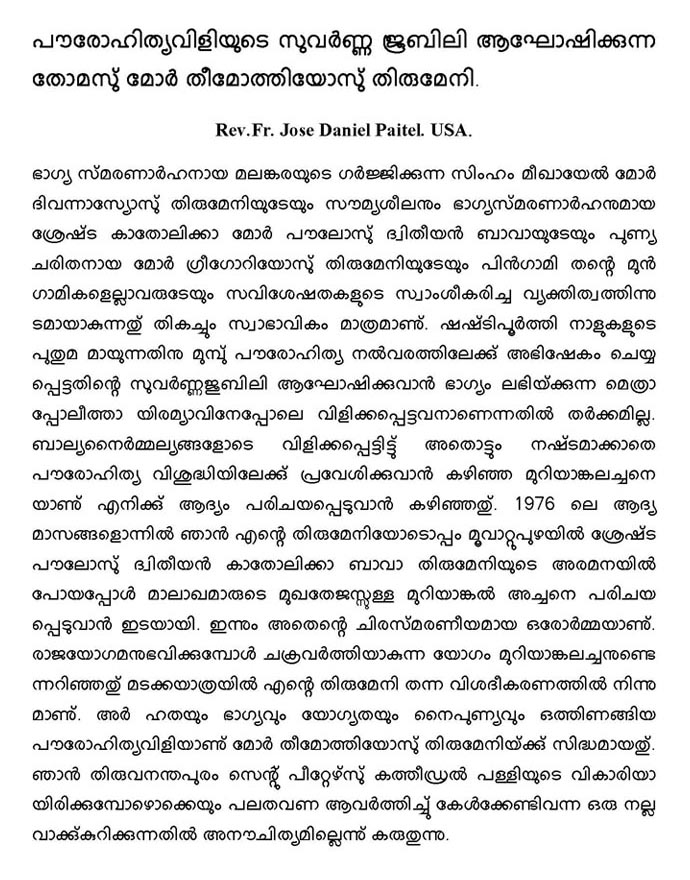 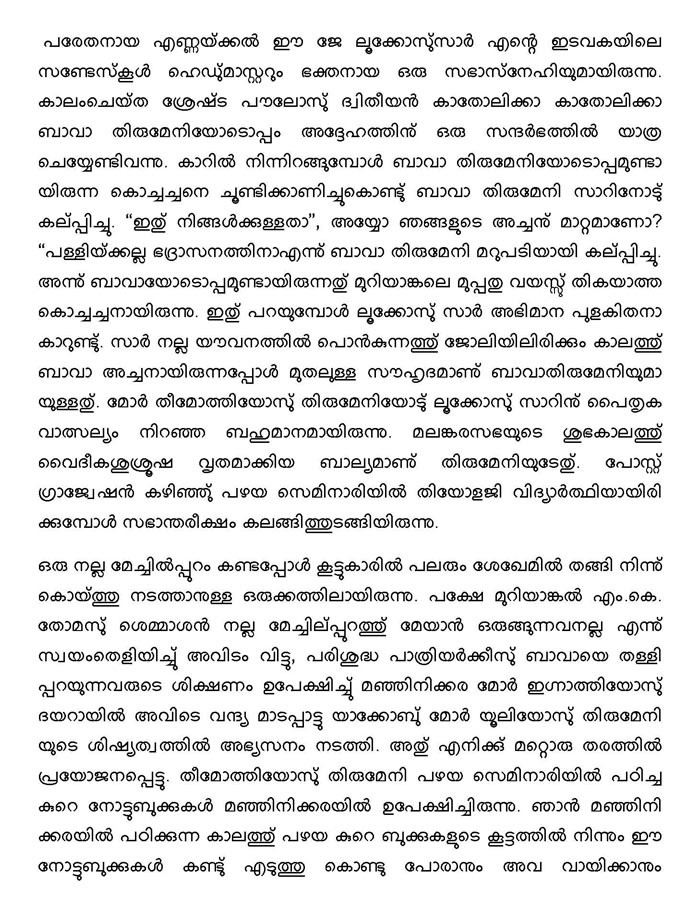 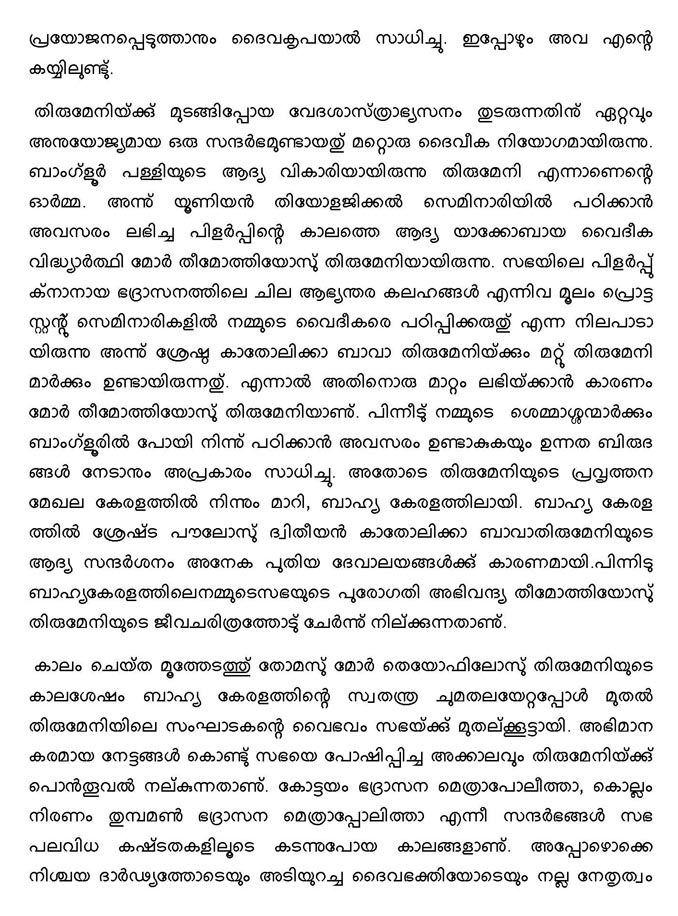 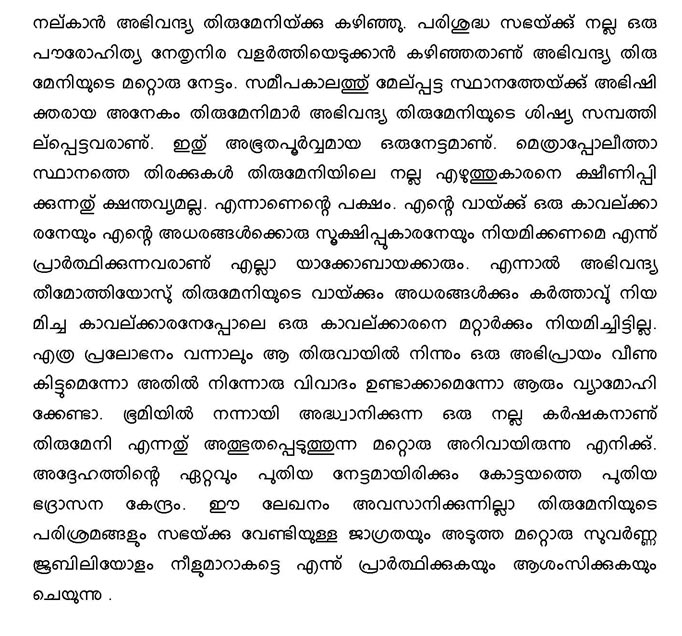 |
|
|
By Very Rev. Mathews Edathara Corepiscopos
Arch Diocesan Secretary, On behalf of the Malankara Archdiocese, NA and myself I would like to honor with prayerful regards H.E. Mor Thomas Themotheos, as H.E. celebrates the 50th anniversary of entering the priesthood. H.E. Themotheos is one of the senior most Metropolitans of the Malankara Jacobite Syrian Orthodox Church and the Diocesan Metropolitan of the Kottayam Diocese of the Syrian Orthodox Church in India. Over the last 50 years, H.E. has served the church in the roles of a deacon, a priest and a Metropolitan. Douglas MacArthur, an American General and once Chief of Staff for the U.S. Army, stated:
The once young deacon and then priest never imagined himself to fill the role of a Diocesan Metropolitan; but this was, in fact, the vision the Lord had for H. Eminence - the role of a leader who would bring innovative and progressive changes to the Church. Under the leadership of H.E., the Kottayam diocese has grown in all sectors most notably, spiritually. The reason behind H. Eminence's success in nurturing and developing the Kottayam Diocese lies within the character and humble personality of H. Eminence. Even in the most difficult situations we have seen Thirumeni stand strong and face and overcome obstacles calmly. Based on the activities fostered by Thirumeni it is clearly evident that Thirumeni has a drive and vision for the future of the Church. The ability to take bold and powerful decisions and the courage to follow through with them differentiates Thirumeni from many others. This is an admirable quality that very few true leaders portray - Thirumeni possesses this quality genuinely. Thirumeni's forward thinking and ability to implement new ideas without hesitation distinguishes his ability to lead with honor and dignity. Without altering the faith or traditions of the Holy Church, Thirumeni was able to setup Churches throughout India. When the Greater India Dioceses were under the leadership of Thirumeni, we were able to witness a tremendous growth of these parishes. The establishment of numerous parishes, congregations and various institutions speak volumes of Thirumeni's ability to lead. The respect of many throughout the Christian community, as well as various societies, implies the character of friendship within Thirumeni. This genuine character has allowed Thirumeni to create harmony amongst people of many walks of life and religions. Thirumeni's allegiance to the Holy Throne can be seen from H. Eminence's unwavering stance on the faith and theology and the acceptance of the Head of the Syriac Orthodox Church as the Patriarch of Antioch. Whenever this authority was questioned, Thirumeni stood strongly against opposing forces to defend the foundations of the Holy Church. It is the blessings of our forefathers of the Church that have given such an eminent leader to the Kottayam Diocese. Themotheos Thirumeni and American Archdiocese: The American Archdiocese is indebted to Thirumeni in various ways. The faithful of this diocese will never forget the paternal care and support given to by Thirumeni to our diocese, our Archbishop Mor Yeldho Titus, the priests and deacons along with the faithful of this diocese, during joyous and difficult times. For example, when there was a shortage of priests to serve in the American Archdiocese, Thirumeni graciously sent priests from the Kottayam Diocese. We were blessed by the visits made by H.E. to the North American diocese. The last major event attended by H.E. was the 2012 Youth & Family Conference held at Emmittsburg, MD, where H.E. was the Chief Guest. The faithful of this diocese showed their love to H.E. by supporting financially the various projects of the Kottayam diocese. Although I have served the North American Archdiocese longer in years of service than I have in my home diocese of Kottayam, I still have a link back to the place which I call home. The spiritual support and paternal love given by H.E. is incomparable. Each time I have had the opportunity to visit Thirumeni , while in India, H.E. has received me with a warm, heartfelt welcome. I have had the opportunity to be graced by H. Eminence during several visits to Augusta, GA. During these visits I, along with my family and parish members, was able to see firsthand the genuine and humble character of Thirumeni. May the Lord continue to bless H.E. with good health and life to serve the Holy Church. Although H.E. Themotheos never imagined this life for himself, it was already prepared for Him by our Lord. In the fifty years of service, I truly believe that H.E. has fulfilled the role of a true shepherd and leader in the Holy Church. With sincere heartfelt joy as we praise the Lord for the blessings granted upon H. Eminence.
Sincerely, |
|
|
by Chev. Shibu Mathew, Pullolickal This Mangala Pathram was prepared for the 60th birthday celebrations of Themotheos Thirumeni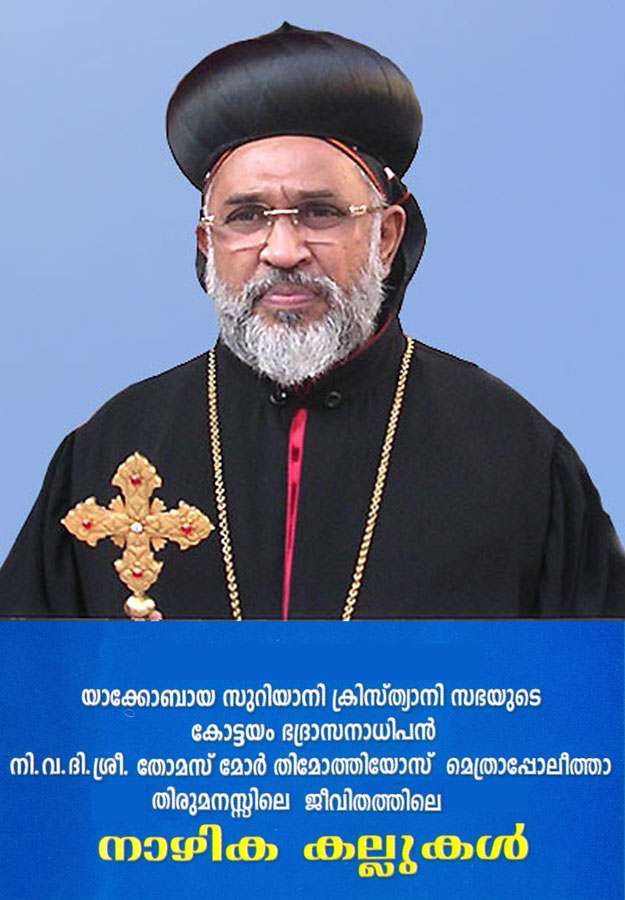
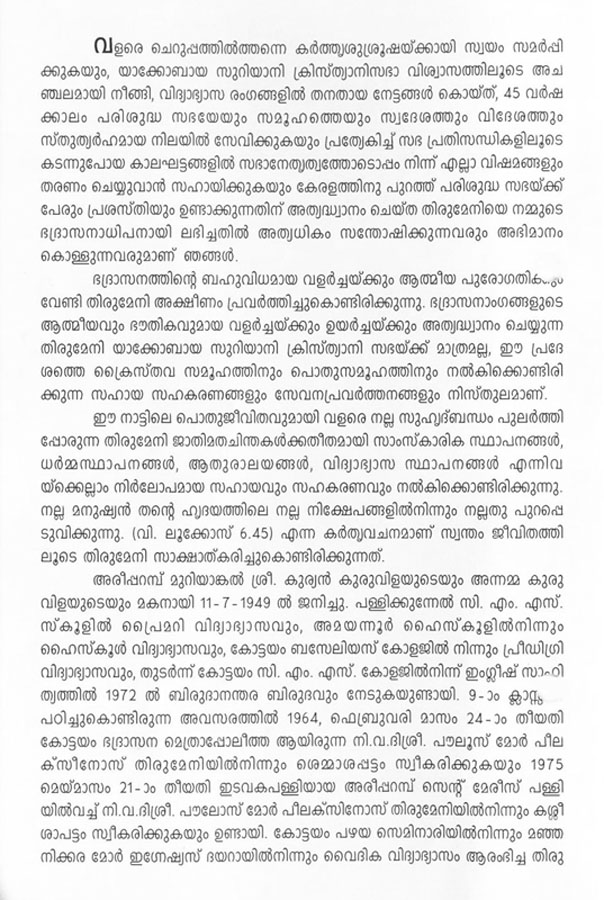 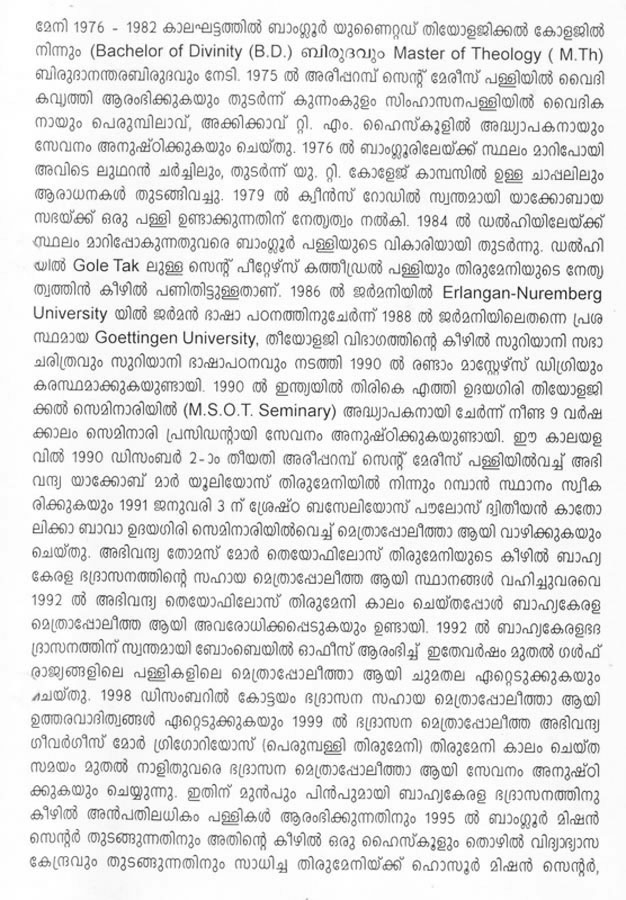 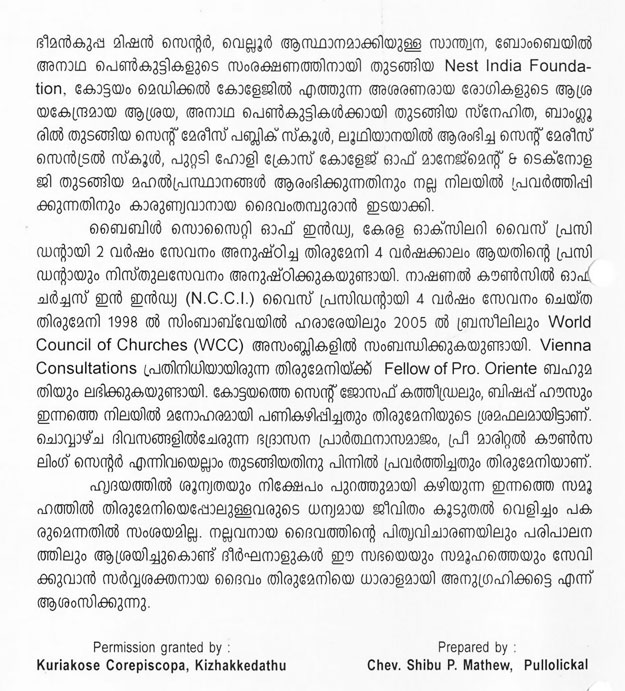
|
|
|
HG Dr. Thomas Mor Themotheos was born on 2nd May 1950 in the Muriyankal family of the Lakkattoor village (Kottayam District, Kerala, India) to Mr. Kurian Kuruvilla and Mrs. Annamma Kuruvilla, as the sixth of their eight children. Thomas had his primary education in the village CMS School (Church Missionary Society School) originally an Anglican Church Missionary Society). Middle School and High School education were completed at the Amayannoor High School. In 1964, while in the ninth grade, Thomas was ordained as sub-deacon (Korooyo) by Mar Philexinos Paulose (later Catholicos Baselius Paulose II) who was then Metropolitan of the Kottayam Diocese. His parish priest, Cor Episcopo V. Rev. Thomas Mattathil, imparted early instruction in Syriac and liturgical rites. Having completed the Secondary School Leaving Certificate (SSLC) examination in 1965, Dn. Thomas joined the Baselius College, Kottayam for Pre-Degree course. Subsequently, he joined the CMS College, Kottayam, where he continued till 1972, graduating with Bachelors and Masters Degrees in English literature. In 1973, Dn. Thomas joined the Old Seminary, Kottayam for theological studies. He could study there only for a year due to the then erupting volatile situation in the Malankara Church, which had its echoes in the Seminary too. Finding it difficult to continue, Dn. Thomas joined the Manjinikkara Dayra for Syriac Studies and priestly formation. Under the spiritual guidance of V. Rev. Jacob Madapattu Remban (later Metropolitan H.G. Mar Julius Yakoub), he completed liturgical studies. During the one year's stay at the monastery, he completed Bachelor of Education degree (B.Ed) at the NSS Training College, Pandalam. While at the Seminary, late Metropolitan of Kottayam Diocese, H.G. Mor Gregorius Gheevarghese (Perumpilly Thirumeni) ordained him shamshono (full deacon) on 24 February 1964. On 21 May 1975, H.G. Mor Philexinos Paulose (later Catholicos) ordained him as priest. Thereupon, Fr. Thomas began to assist the vicar of his parish. Later he began to teach at the T.M. High School, Akkikavu close to Perumpilavu near Kunnamkulam. While teaching there, he assisted Rev. Fr. K.V. Kuriakose (the late H.G. Mar Julius Kuriakose), at the Simhasana Church, Kunnamkulam. When late Mor Philexinos Paulose was elevaed as Catholicose of the East, His Beatitude invited Fr. Thomas to assist him at the Muvattupuzha Aramana. After a few months, Fr. Thomas was appointed as vicar of the St. Mary's Church, Bangalore. This became a turning point in his life. He served the congregation in that capacity for eight years until 1984. During this period, along with his pastoral duties, Fr. Thomas completed Bachelor of Divinity and Master of Theology Degrees. The St. Mary's Church in Bangalore was built during this period. The now famous St. Mary's Public School also was started in 1982 with four students and one Teacher. In 1984, Fr. Thomas was appointed as the vicar of St. Peter's Church, New Delhi. He served there for two years organizing the parish and making preparations for the construction of the St. Peter's Cathedral, New Delhi. In 1986, he went to Germany for higher studies and joined the Erlangen-Nuremburg University. After completing studies in German language, he moved to the Goettingen University in 1987, to pursue Syriac patristic studies. He returned to India in 1990, after being elected to the bishopric of the Outside Kerala Diocese. On 3rd January, 1991, Fr. Thomas was consecrated bishop by late H.B. Catholicos Baselius Paulose II, giving the name Themotheos, and was appointed to assist the then Metropolitan of the outside Kerala Diocese H.G. Mar Theophelos Thomas who was advanced in age. When HG passed away on 12th January 1992, Mar Themotheos was given full responsibility of the Diocese.
The Metropolitan established his administrative office at Mulund, Bombay. A new publication, "The Vision" was started thereafter and continued to be published as a bilingual monthly till 2009. In 1993, when a severe earthquake occurred in the Latur District of Maharashtra, His Grace launched a rehabilitation program with the support of the entire Church. Gram Jyothi Social Welfare Centre was established at the Harangul village in Latur which served three villages with health clinics and educational programs.
The St. Mary's High School, Ludhiana was started in the second half of nineteen nineties by His Grace. Ten acres of Land was purchased in 1996 at Anagalpura near Bangalore city and a mission centre was organized there. The Centre started the St. George's School, which is now a full-fledged high School with 720 students. In 1998, when the late Metropolitan of Kottayam Diocese, H.G. Gregorius Gheevarghese (Perumpally Thirumeni) fell ill, Mar Themotheos Thomas assumed responsibility of the Kottayam Diocese as assistant Metropolitan in 1998. After the demise of Mor Gregorius (Perumpally Thirumeni) on February 22nd, 1999, full responsibility of the Diocese was entrusted to Mar Themotheos. Couple of years later His Grace was given responsibilities as Assistant Metropolitan of the South Kerala Dioceses of Thumpamon, Niranam and Quilon. HG faithfully discharged this responsibility for the next three years. Pre-marital counselling was started in year 2000 and it has become a model activity for other Dioceses in the Church. Thousands of couples have undergone this training successfully in Kottayam Diocese. His Grace served as the President of the Malankara Syrian Orthodox Theological Seminary at Udayagiri, near Mulanthuruthy for nine years from 1992 onwards. For three years, His Grace was the President of the Youth Association of the Malankara Church.
His Grace participated several times in the Vienna Consultations - the dialogue between the Roman Catholic Church and the Oriental Orthodox Churches. H.G. represented the Syrian Orthodox Church in the eighth Assembly of the World Council of Churches, held at Harrare in Zimbabwe in 1998 and the WCC Assembly of 2005, held in Brazil. H.G. is a regular participant in forums of the National Council of Churches in India (NCCI). From 2002 to 2006 he was the Vice-President of the NCCI. Mar Themotheos has also been a key participant in the dialogue between the Malankara Syrian Orthodox Church and the Catholic Church that produced an agreement on inter-confessional marriages.
As Metropolitan of the Outside Kerala Diocese (later Syrian Orthodox Arch-Diocese of Greater India), His Grace was able to establish more than 50 parish churches throughout the length and breadth of the Indian union. In addition to this, the Anagalpura Mission Centre, the Bhiman Kuppa Centre along the Mysore Road and the Mission centre at Hosur were developed under the leadership of Metropolitan Thomas Themotheos. The Nest India Foundation in Bombay for the destitute children (for girls) was organized in 1998. It is functioning quite well with its own building to accommodate 35 girl children. A team of co-workers struggle hard for taking care of the children and their education. It is a commendable charity work initiated by His Grace. The Swathana Guidance and Counselling Centre Vellore, was started by the efforts of His Grace, and now it is functioning as a centre of assistance to many who seek treatment at the Christian Medical College Hospital, Vellore. In the Kottayam Diocese, 'Snehitha', a charitable home for the orphaned or semi-orphaned girl children was started on 24 April, 2007. It is functioning well with several girl children. The Aasraya Guidance and Counselling Centre is actually an offshoot of the Anagalpura Mission Centre in Bangalore. The Centre is providing mid day meal to a large number of patients and their family at the Government Medical College Hospital, Kottayam. Patients who need long term treatment are provided accommodation at Aasraya. Aasraya began its operations on March 15, 2007. Throughout his life, HG has given great importance to providing education to the younger generation who will be the leaders of the next generation. In 1983 he started St. Mary's School at Queen's Road, Bangalore. This school has grown to a High School with one thousand students now.
Preparations for the beginning of the Holy Cross College of Management and Technology (HCCMAT) Puttady (near Kumily, Idukki District) were begun in 1999. Holy Cross Educational Trust was formed (incorporated) in 2000. In 2001 Bombay Estate, a piece of land at Puttady, was purchased. In 2002 application was submitted for permission, to start a Management College, and it was granted in the same year. In June 2003 the College began its operations. The first building of the College was completed in September 2003 and classes were moved from the parish hall of St. Mary's Jacobite Church, Puttady to the completed building. In 2005, construction of the main Block of the HCCMAT, began. Over a period eight years, the impressive main building was completed and on 24 May 2013, the same was inaugurated by the Chief Minister, Shri. Oommen Chandy. It is a First Grade Management College with five undergraduate and two Post- graduate courses. It's a full-fledged Centre of the Indhira Gandhi National Open University (IGNOU) Delhi.
The construction of the Syrian Christian Centre at Kanjikuzhy began in March 2010. It is expected to complete by end of 2014. This is going to be a land mark structure in that area.
His Grace established the Aardra Charitable Trust in February, 2013 with several activities. A team of dedicated men and women look after the Aardra Clinic and the allied activities at Illickal, Kottayam.
His Holiness Ignatius Zakka I Iwas The Prince Patriarch of Antioch & all the East, Supreme head of the Universal Syrian Orthodox Church, awarded the title, 'NAHEERO' to Thirumeni at St. Joseph's Cathedral in 2013 during the inaugural program of paurohitya jubilee and 65th birthday celebrations.
His Grace is celebrating the 50th anniversary of his ordination as Sub Deacon on February 23, 2014 at his home Parish, St. Mary's Jacobite Church Areeparambu. |
|
|
by Fr. Mark
Source: Vultus Christi |
|
|
With over 6000 articles and hundreds of
links to outside resources covering all aspects
of Syriac Orthodoxy that are of interest to Family, Malankara World is the
premier source for information for Malankara Diaspora. In addition to articles on
spirituality, faith, sacraments, sermons, devotionals, etc., Malankara World also
has many general interest articles, health tips, Food and Cooking, Virtual Travel,
and Family Specific articles. Please visit
Malankara World by clicking here or cut and paste the link on your browser:
http://www.MalankaraWorld.com/Library/default.htm
Malankara World Journal Subscription If you are not receiving Malankara World Journal directly, you may sign up to receive it via email free of cost. Please click here: http://www.MalankaraWorld.com/Library/Register/news_regn.asp You can contact us via email at mail@malankaraworld.com Malankara World Journal Archives Previous Issues of Malankara World Journal can be read from the archives here. You can contact us via email at mail@malankaraworld.com Thank you for your help and support. Malankara World Team |
|
|
Malankara World Journal is published by MalankaraWorld.com
http://www.MalankaraWorld.com/
Copyright © 2011-2019 Malankara World. All Rights Reserved. |
